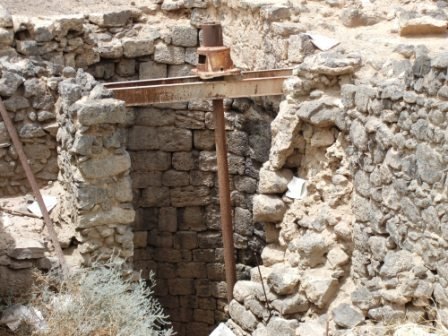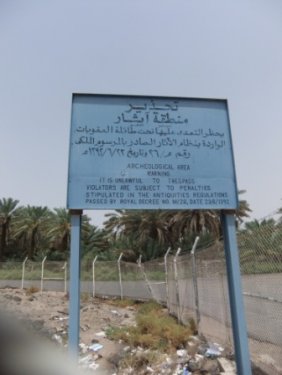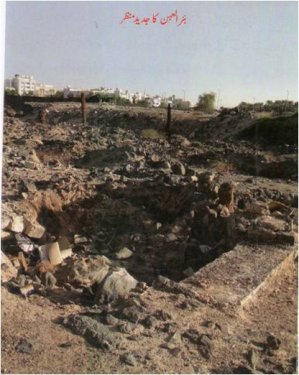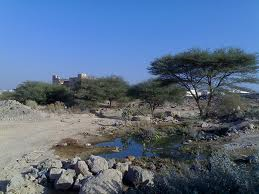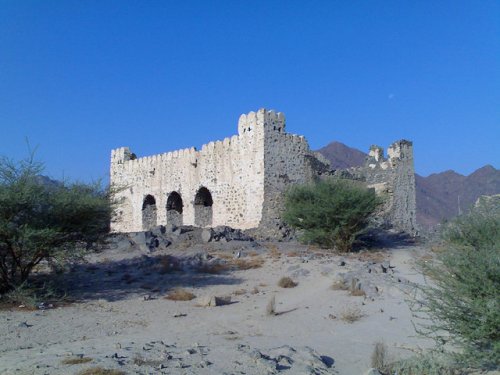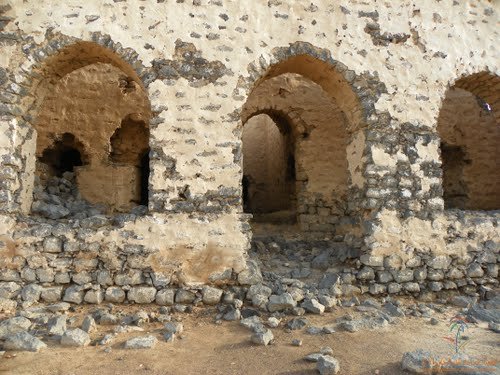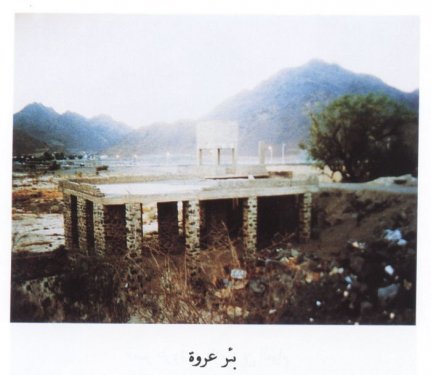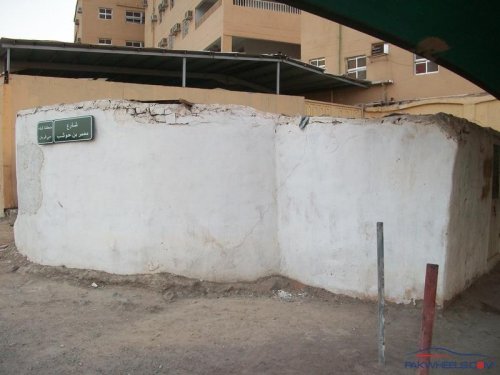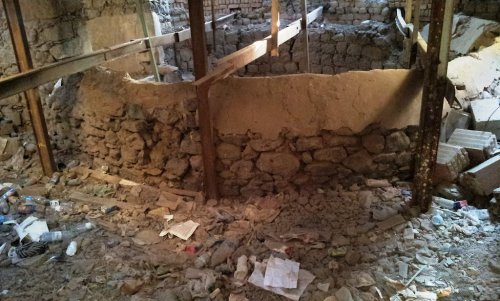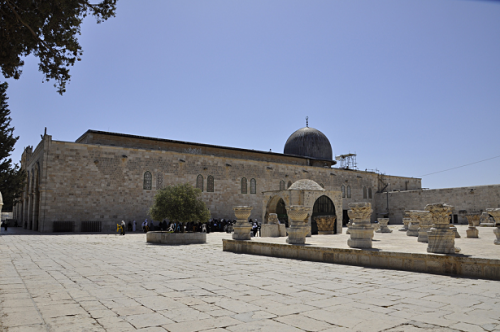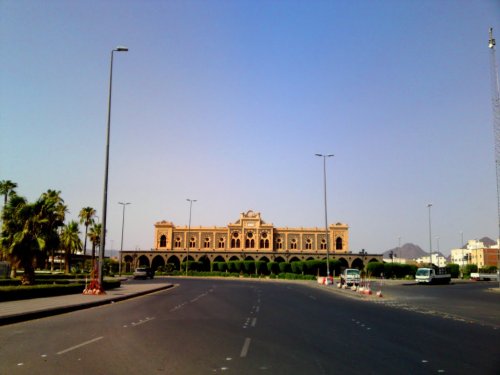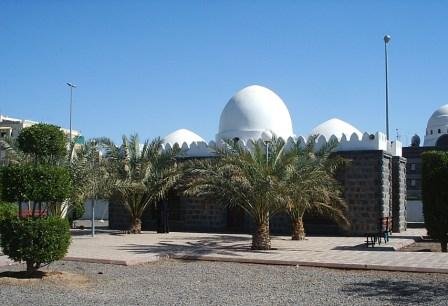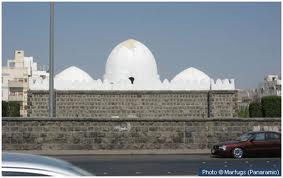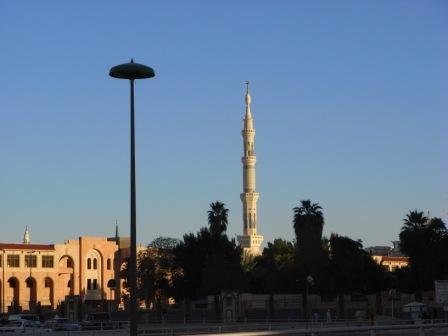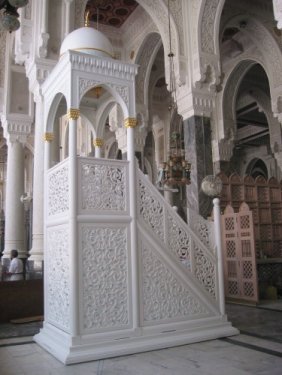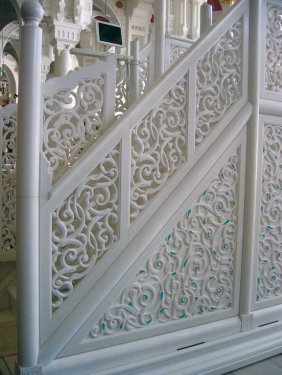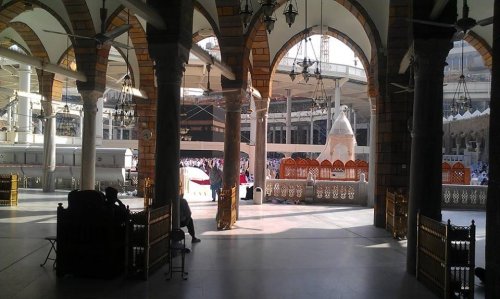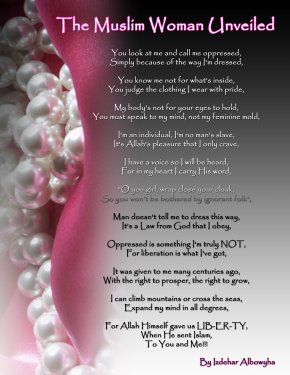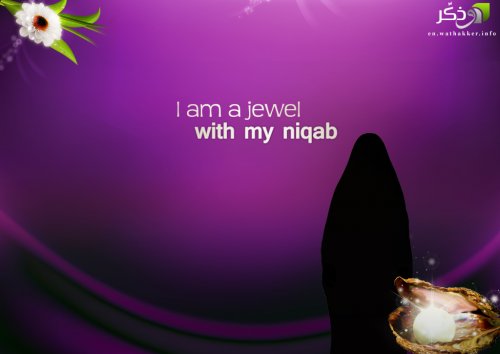-
Posts
8,465 -
Joined
-
Days Won
773
Content Type
Profiles
Forums
Events
Everything posted by ummtaalib
-
Futile Arguments by Hazrat Maulana Yunus Patel Saheb (rahmatullah alayh) It seems as if everyone has something to argue about these days. Arguing is a waste of precious time and a diversion of shaytaan, from carrying out good deeds or rendering services to Deen. We do not have to worry about arguing with every other person. We have got no time to argue with people. Only that person will go around arguing with people who has got the time. …He has got the time to waste, therefore he will go around arguing. One person went to the barber and said : “I have got black and white hair. So just take out all the white hair.” The barber shaved off all his hair, placed it in front of the man and said: “Now you can pick out all the white strands. I do not have the time for that.” The person whose heart is connected with Allah Ta’ala does not have the time for arguments, for fights, for unnecessary quarrels and for wasting time over useless, futile activities. “That person whose eye is on where the orders are coming, will not waste his time going and fighting with everybody.” One person wrote a lengthy letter to me. He mentioned, amongst other things: “Maulana, you and all your blind followers who attend your programmes…” – have got this weakness, this weakness, this weakness.” I gave the reply: “JazakAllah for informing us of some of our weaknesses. There are many more which Allah Ta’ala has concealed. I make Shukr to Allah Ta’ala that He did not reveal all our weaknesses. Please do keep me informed when you notice more weaknesses, and make Dua that Allah Ta’ala gives us Hidayat.” That is all! Finished! …What am I going to start arguing about? Futile arguing creates restlessness and darkness in the heart. It opens the door to misguidance. It leads a person away from Siratul Mustaqeem (the straight path). Rasulullah (Sallallaahu ‘alayhi wasallam) cautioned us: “No people will go astray after having being guided except that they become argumentative.”[1] Thus, we should not waste time over pettiness. We do not have the time for that. There will always be enemies; there will always be jealousy; there will always be malice. …There will be those who cannot see or stomach the progress of certain people and who will want to create unnecessary trouble and impede the person’s progress. This will happen. It happened in the time of Rasullullah (Sallallaahu alayhi wassallam) – and will continue. So we should be careful not to get caught up with these type of wasteful issues. Rasulullah (Sallallaahu ‘alayhi wasallam) said: “I guarantee a house in the outskirts of Paradise to the one who forsakes argument even when he is in the right.’[2] If we keep before us this Hadeeth and have Yaqeen (conviction) on the words of Rasulullah (Sallallaahu ‘alayhi wasallam), many arguments would not even surface. Source
-
- 1
-

-
Question Salam. I've got a question. If a woman has a miscarriage after 7weeks n she bleeds after that, is that haidh, nifaas or istihaaza blood Answer Bismillahir Rahmaanir Raheem Al Jawaab wa Billahit-Tawfeeq Respected questioner, May this find you and your family in the best of states. The Messenger of Allah, peace and blessings of Allah upon him, said, “Indeed the miscarried fetus will confront his Lord if He enters his parents into the Fire. So it will be said to him, “O fetus which confronts his Lord! Enter your parents into Paradise.” So he will drag them by his [umbilical] cord until he enters them into Paradise.” [ibn Majah] As for now, have patience and make dua to Allah ta’ala, striving to be of those who Allah says of them: “Indeed Allah is with those who are patient.” A certain woman miscarried. If a few parts of the child have been formed, then whatever blood comes out after miscarrying will also be nifaas. But if no part at all has been formed, it will not be nifaas. If that blood could be regarded as haid, it will be haid. If not, it will be istihaada, eg. The blood flows for less than three days or she has not completed the full fifteen days of purity as yet - it will be regarded as istihaada. [1] Refernces: [1] [Heavenly ornaments Molana ashraf Ali thanvi Zamzam publisher, PG 104] It takes 120 days for the body features to form. It states in Radd ul Muhtaar: (وسقط) مثلث السين: أي مسقوط (ظهر بعض خلقه كيد أو رجل) أو أصبع أو ظفر أو شعر، ولا يستبين خلقه إلا بعد مائة وعشرين يوما (ولد) حكما (فتصير) المرأة (به نفساء والأمة أم ولد ويحنث به) في تعليقه وتنقضي به العدة، فإن لم يظهر له شيء فليس بشيء، والمرئي حيض إن دام ثلاثا وتقدمه طهر تام وإلا استحاضة، (قَوْلُهُ وَالْمَرْئِيُّ) أَيْ الدَّمُ الْمَرْئِيُّ مَعَ السِّقْطِ الَّذِي لَمْ يَظْهَرْ مِنْ خَلْقِهِ شَيْءٌ (قَوْلُهُ وَتَقَدَّمَهُ) أَيْ وُجِدَ قَبْلَهُ بَعْدَ حَيْضِهَا السَّابِقِ، لِيَصِيرَ فَاصِلًا بَيْنَ الْحَيْضَتَيْنِ. وَزَادَ فِي النِّهَايَةِ قَيْدًا آخَرَ، وَهُوَ أَنْ يُوَافِقَ تَمَامَ عَادَتِهَا، وَلَعَلَّهُ مَبْنِيٌّ عَلَى أَنَّ الْعَادَةَ لَا تَنْتَقِلُ بِمَرَّةٍ وَالْمُعْتَمَدُ خِلَافُهُ فَتَأَمَّلْ. (قَوْلُهُ وَإِلَّا اسْتِحَاضَةٌ) أَيْ إنْ لَمْ يَدُمْ ثَلَاثًا وَتَقَدَّمَهُ طُهْرٌ تَامٌّ، أَوْ دَامَ ثَلَاثًا وَلَمْ يَتَقَدَّمْهُ طُهْرٌ تَامٌّ، أَوْ لَمْ يَدُمْ ثَلَاثًا وَلَا تَقَدَّمَهُ طُهْرٌ تَامٌّ ح (قَوْلُهُ وَلَوْ لَمْ يُدْرَ حَالُهُ إلَخْ) أَيْ لَا يَدْرِي أَمُسْتَبِينٌ هُوَ أَمْ لَا؟ بِأَنْ أَسْقَطَتْ فِي الْمَخْرَجِ وَاسْتَمَرَّ بِهَا الدَّمُ، فَإِذَا كَانَ مَثَلًا حَيْضُهَا عَشْرَةً وَطُهْرُهَا عِشْرِينَ وَنِفَاسُهَا أَرْبَعِينَ، فَإِنْ أَسْقَطَتْ مِنْ أَوَّلِ أَيَّامِ حَيْضِهَا تَتْرُكُ الصَّلَاةَ عَشْرَةً بِيَقِينٍ؛ لِأَنَّهَا إمَّا حَائِضٌ أَوْ نُفَسَاءُ ثُمَّ تَغْتَسِلُ وَتُصَلِّي عِشْرِينَ بِالشَّكِّ لِاحْتِمَالِ كَوْنِهَا نُفَسَاءَ أَوْ طَاهِرَةً ثُمَّ تَتْرُكُ الصَّلَاةَ عَشْرَةً بِيَقِينٍ؛ لِأَنَّهَا إمَّا نُفَسَاءُ أَوْ حَائِضٌ، ثُمَّ تَغْتَسِلُ وَتُصَلِّي عِشْرِينَ بِيَقِينٍ لِاسْتِيفَاءِ الْأَرْبَعِينَ، ثُمَّ بَعْدَ ذَلِكَ دَأْبُهَا حَيْضُهَا عَشْرَةٌ وَطُهْرُهَا عِشْرُونَ، وَإِنْ أَسْقَطَتْ بَعْدَ أَيَّامِ حَيْضِهَا فَإِنَّهَا تُصَلِّي مِنْ ذَلِكَ الْوَقْتِ قَدْرَ عَادَتِهَا فِي الطُّهْرِ بِالشَّكِّ ثُمَّ تَتْرُكُ قَدْرَ عَادَتِهَا فِي الْحَيْضِ بِيَقِينٍ. وَحَاصِلُ هَذَا كُلِّهِ أَنَّهُ لَا حُكْمَ لِلشَّكِّ، وَيَجِبُ الِاحْتِيَاطُ. اهـ مِنْ الْبَحْرِ وَغَيْرِهِ، وَتَمَامُ تَفَارِيعِ الْمَسْأَلَةِ فِي التَّتَارْخَانِيَّة، وَنَبَّهَ فِي الْبَدَائِعِ عَلَى أَنَّ فِي كَثِيرٍ مِنْ نُسَخِ الْخُلَاصَةِ غَلَطًا فِي التَّصْوِيرِ مِنْ النُّسَّاخِ (قَوْلُهُ وَلَا عَدَدَ أَيَّامِ حَمْلِهَا) هَذَا زَادَهُ فِي النَّهْرِ بِقَوْلِهِ: وَكَانَ يَنْبَغِي أَنْ يُقَالَ وَلَمْ تَعْلَمْ عَدَدَ أَيَّامِ حَمْلِهَا بِانْقِطَاعِ الْحَيْضِ عَنْهَا، أَمَّا لَوْ لَمْ تَرَهُ مِائَةً وَعِشْرِينَ يَوْمًا ثُمَّ أَسْقَطَتْهُ فِي الْمَخْرَجِ كَانَ مُسْتَبِينَ الْخَلْقِ. اهـ [رد المحتار علي الدر المختار، كتاب الطهارة، باب الحيض، الجزء ١، الصفحة ٥٠٠، دار العالم الكتب رياض] It states in Al Fatawa Al Hindiyyah: لَوْ خَرَجَ أَكْثَرُ الْوَلَدِ تَكُونُ نُفَسَاءَ وَإِلَّا فَلَا وَكَذَا لَوْ انْقَطَعَ فِيهَا وَخَرَجَ أَكْثَرُهُ وَالسَّقْطُ إنْ ظَهَرَ بَعْضُ خَلْقِهِ مِنْ أُصْبُعٍ أَوْ ظُفْرٍ أَوْ شَعْرِ وَلَدٍ فَتَصِيرُ بِهِ نُفَسَاءَ. هَكَذَا فِي التَّبْيِينِ وَإِنْ لَمْ يَظْهَرْ شَيْءٌ مِنْ خَلْقِهِ فَلَا نِفَاسَ لَهَا فَإِنْ أَمْكَنَ جَعْلُ الْمَرْئِيِّ حَيْضًا يُجْعَلُ حَيْضًا وَإِلَّا فَهُوَ اسْتِحَاضَةٌ. [الفتاوي الهندية، كتاب الطهارة، باب الدماء المختصة بالنساء، الجزء ١ الصفحة ٤٢، دارالكتب العلمية] It states in Fath ul Qadeer: وَلَنَا أَنَّ بِالْحَبَلِ يَنْسَدُّ فَمُ الرَّحِمِ كَذَا الْعَادَةُ، وَالنِّفَاسُ بَعْدَ انْفِتَاحِهِ بِخُرُوجِ الْوَلَدِ، وَلِهَذَا كَانَ نِفَاسًا بَعْدَ خُرُوجِ بَعْضِ الْوَلَدِ فِيمَا رُوِيَ عَنْ أَبِي حَنِيفَةَ وَمُحَمَّدٍ رَحِمَهُمَا اللَّهُ لِأَنَّهُ يَنْفَتِحُ فَيَتَنَفَّسُ بِهِ (وَالسَّقْطُ الَّذِي اسْتَبَانَ بَعْضُ خَلْقِهِ وَلَدٌ) حَتَّى تَصِيرَ الْمَرْأَةُ بِهِ نُفَسَاءَ وَتَصِيرُ الْأَمَةُ أُمَّ وَلَدٍ بِهِ وَكَذَا الْعِدَّةُ تَنْقَضِي بِهِ (قَوْلُهُ بِخُرُوجِ بَعْضِ الْوَلَدِ) أَيْ أَكْثَرُهُ (قَوْلُهُ وَالسَّقْطُ الَّذِي اسْتَبَانَ بَعْضَ خَلْقِهِ) كَأُصْبُعٍ أَوْ ظُفْرٍ (وَلَدٌ) فَلَوْ لَمْ يَسْتَبِنْ مِنْهُ شَيْءٌ لَمْ يَكُنْ وَلَدًا فَإِنْ أَمْكَنَ جَعْلُهُ حَيْضًا بِأَنْ امْتَدَّ جَعْلُ إيَّاهُ وَإِلَّا فَاسْتِحَاضَةٌ. وَفِي الْفَتَاوَى: طَهُرَتْ شَهْرَيْنِ فَظَنَّتْ أَنَّ بِهَا حَبَلًا ثُمَّ أَسْقَطَتْ بَعْدَ شَهْرَيْنِ سَقْطًا لَمْ يَسْتَبِنْ خَلْقَهُ وَقَدْ رَأَتْ قَبْلَ الْإِسْقَاطِ عَشَرَةً دَمًا يَكُونُ حَيْضًا لِأَنَّهُ بَعْدَ طُهْرٍ صَحِيحٍ، وَهِيَ لَمَّا أَسْقَطَتْ سِقْطًا لَمْ يَسْتَبِنْ شَيْءٌ مِنْ خَلْقِهِ لَمْ تُعْطَ حُكْمَ الْوِلَادَةِ فِي شَيْءٍ مِنْ الْأَحْكَامِ فَحُكِمَ بِأَنَّ هَذَا كَانَ دَمًا انْعَقَدَ ثُمَّ تَحَلَّلَ فَخَرَجَ فَلَمْ يَكُنْ دَمًا حَامِلِ فَكَانَ حَيْضًا [شرح فتح القدير، كتاب الطهارة، باب الحيض و الإستحاضة، فصل في النفاس، الجزء ١، الصفحة ١٨٩، دار الكتب العلمية] It states in Al Badai us Sanai: وَالسِّقْطُ إذَا اسْتَبَانَ بَعْضُ خَلْقِهِ فَهُوَ مِثْلُ الْوَلَدِ التَّامِّ يَتَعَلَّقُ بِهِ أَحْكَامُ الْوِلَادَةِ مِنْ انْقِضَاءِ الْعِدَّةِ، وَصَيْرُورَةِ الْمَرْأَةِ نُفَسَاءَ لِحُصُولِ الْعِلْمِ بِكَوْنِهِ وَلَدًا مَخْلُوقًا عَنْ الذَّكَرِ، وَالْأُنْثَى بِخِلَافِ مَا إذَا لَمْ يَكُنْ اسْتَبَانَ مِنْ خَلْقِهِ شَيْءٌ لِأَنَّا لَا نَدْرِي ذَاكَ هُوَ الْمَخْلُوقُ مِنْ مَائِهِمَا، أَوْ دَمٍ جَامِدٍ، أَوْ شَيْءٍ مِنْ الْأَخْلَاطِ الرَّدِيَّةِ اسْتَحَالَ إلَى صُورَةِ لَحْمٍ، فَلَا يَتَعَلَّقُ بِهِ شَيْءٌ مِنْ أَحْكَامِ الْوِلَادَةِ. [البدائع الصنائع في ترتيب الشرائع، كتاب الطهارة، الجزء ١، الصفحة ٣٠٠، دار الكتب العلمية] And Allah knows best -------------------------------------- Please remember me in your dua's Maulana Khalil Ibn Ilyas Laher London, UK http://www.muftisays.com/qa/question/4241/miscarriage-and-blood.html
-
By M. Burhanuddin Qasmi August 2007, the 60th anniversary of India's freedom, we undivided Indians will celebrate it with proud and all possible glitters. That's alright! But remember, what our history is telling about freedom struggle is not all— there are pages deliberately forgotten, dusted with prejudiced and narrowness or completely removed from our history books. A part of this argument was carried by Eastern Crescent (May issue), '150 years: The first war of India's independence' which discussed some pages of untold history from 1757 to 1857. And concluded with establishment of Darul Uloom Deoband in 1866 after defeat, heavy lose of lives of freedom fighters in the 1857's united war of independence to continue with the freedom struggle. The discussion below is continuation of the same argument in chronology. In 1877, Shaikhul Hind Maulana Mahmoodul Hasan, the first student of Darul Uloom Deoband, set up an Organisation called ‘Samratut Tarbiyat’ (result of the training). (Tahreek-e Shaikul Hind 61) The aim of the organization was to prepare for armed insurrection against the British. The movement continued for at least 30 years. With Maulana Mohammad Qasmi Nanotwi's demise in 1880 and the lacunas in organizational set up, appeared to be an obstacle for the desired goal, the movement was abandoned. (Aseeran-e Malta 23) In 1909, Shaikhul Hind Maulana Mahmoodul Hasan re-organized his Fidayeen (devotees) under a new banner ‘Jamiatul Ansaar’. Maulana Obaidullah Sindhi had been called to Deoband to take charge of secretariat of this new organization (personal Dairy of Obaidullah Sindhi 20). The first introduction of the Jamiatul Ansar was made at the annual function of Darul Uloom Deoband in 1911. Before 30 thousand distinguished Ulama from around undivided India and out side, the Jamiat declared its aims and objectives and the reason as to why it was necessary to struggle for the freedom of the country. Buoyed by the successful launching and the support that it elicited from the masses, Jamiatul Ansaar organized its first rally at Moradabad town in April 1911. Participants from Aligarh, Nadwatul Ulama Lucknow and Deoband gathered in large numbers. In 1912 and 1913 the Jamiat organized mass gathering and successful public agitation in which thousands of people from Meerut and Shimla took active part. The huge mass support exhibited by Jamiat unnerved the government and they began planning to root out the main source— Darul Uloom Deoband, from where such a powerful organization had sprung. The leading members were asked by Shaikhul Hind to give up their membership of Jamiat in order to save the educational institution from irreparable losses that it might have suffered at the hands of colonial rulers. (Ulama-e Haque 1/131, Yad-e Baiza 107, Moqam-e Mahmood 203-204 and Naqash-e Hayat 2/144) A New Establishment Springs Up in Delhi Soon after the ban of Jamiatul Ansar in 1913, the freedom seekers appeared in Delhi with a new name ‘Nazzaaratul Ma’arif’. Maulana Obaidullah Sindhi and Shaikhul Hind were the leading figures behind this new setup. The zeal, spirit and purpose of the new set up was none the less freedom. Mujahideen (freedom fighters) used the organization as a corridor to reach Delhi. It was also used as a public relation and financial resource base. Maulana Muhammad Ali Jauhar, Maulana Abul Kalaam Azaad, Maulana Sindhi and Shaikhul Hind used to meet here secretly. (Aseeran-e Malta 27 and Ulama-e Haque 1/136) When the First World War (1914) began between Germany and Britain, the freedom fighters once again changed their action plan. They decreased domestic activities and fully concentrated on supporting Germany. (Naqash-e Hayaat 2/210) Shaikhul Hind Visits Hijaz Fidayeen-e Freedom saw the war as a golden opportunity to strike at the roots of the British interest. Armed insurrections were planned against the British forces. Haji Saheb Tarang Zaie and Maulana Saifur Rahman Kabulie from Shaikhul Hind’s Volunteer Group were selected as field commodores with operational base at Zaigi in ‘Bajore, the capital of tribal autonomous Yaghistan. (Al-Jamiat, Sunday edition January 6, 1985). Shaikhul Hind Maulana Mahmoodul Hasan dispatched his deputy, Maulana Obaidullah Sindhi, to Kabul and he himself left for Saudi Arabia. The purpose of the visit was to solicit support from the Muslim countries because without weaponry and their active support it was quite impossible to achieve the goal. Shaikhul Hind reached Makkah on October 9, 1915 and met the Turk Governor, Ghalib Pasha. On his request the powerful Governor of the Usmani Caliphate (Turk) agreed to extend support against the British government. In order to publicize his support among Muslims of the sub-continent, he wrote a long letter exhorting the general public to continue with their struggle, assuring them of his government’s open support in the future. It was before the United States took side to any of the warring parties in word war l. Later when the US government sided with the allied forces— Russia, France and Britain— the whole war scenario changed. Turk and German— Central alliance was defeated. As a consequence of the defeat at the hands of allied forces with full connivance of the United States of America, the Usmani Caliphate was destroyed. The dream of Shaikhul Hind and his lieutenants to drive away the colonialists, by waging war against the British forces on Indian soil, never materialized. (Aseeran-e Malta 34, Naqash-e Hayaat 2/212, 186-87 and Tahreek-e Shaikhul Hind 72) The First Government of India in Exile As mentioned earlier, Maulana Obaidullah Sindhi was sent to Kabul for a special mission. He established a Government in exile there, with Maulana Barkatullah Bhopali and himself as Ministers and Maharaja Pratap Singh as the President. Formation of ‘Lashkar-e- Najat Dehinda’ (Liberation Army) with headquarter in Madinah and Shaikhul Hind Maulana Mahmoodul Hasan as Chief was declared. Meanwhile, an international set up by the name of ‘Junoodur Rabbaniyah’ (Army of God) was formed. The purpose of this group was to represent the movement around the world in order to garner international support against the colonial rule. Shaikhul Hind was named Al-Qayed (the Leader) of this group too. (Tahreek-e Shaikhul Hind 281, 282 & 271). Maulana Obaidullah Sindhi wrote a letter to Maulana Mahmoodul Hasan, in Saudi Arabia, with details of his activities in Kabul and the future plan. The letter was written on a silk piece of cloth. Maulana Mohammad Mian Mansoor Ansari also enclosed a long letter detailing office bearer’s name of the Government in Exile and a blueprint for Junoodur Rabbaniyah. These letters were dispatched to Madinah through Shaikh Abdur Raheem Sindhi. However, on the way these letters reached in the hands of a neo-Muslim named ‘Rab Nawaz’. The same was passed to the British Commissioner in Multan. The date inscribed on the Silk letter was 8/9 Ramdhanul Mubarak 1334 A.H., corresponding to 9/10 July 1916, which reached at the hand of Commissioner in the first week of August 1916. How such a grievous blunder occurred, no one could explain it later! (Naqash-e Hayaat 2/213, Thareek-e Shaikhul Hind 268-269) Tahreek-e Reshmi Rumaal As a consequence of the disclosure of ‘Silk Letter Conspiracy’, as in the British record, or ‘Tahreek-e Reshmi Rumaal’ of 1916 against the British Empire, 222 pioneering Ulama from all over the country were arrested on this charge. (Muqaam-e Mahmood 297-298) Shaikhul Hind and his comrades Maulana Waheed Ahamad Faizabadi, Maulana Azeez Gul, Hakim Syed Nusrat Hussain and Maulana Hussain Ahmad Madni were arrested in Hijaz (Makkah) on 23 Safar, 1335 A.H. They were sent to Malta via Cairo by a ship on 29 Rabius Sani 1335 A.H. corresponding to 21 February 1917 and clamped in the prison for 3 years and 4 months. They were released and reached Bombay on June 8, 1920. However, Maulana Obaidullah Sindhi and Maulana Mohd. Mian Mansoor Ansari had to remain in exile for several years. (Abstract: Safar Nama-e Malta 118-127, Aseeran-e Malta 51 and Naqash-e Hayaat 2/135) Jamiat Ulama-e Hind The Indian National Congress was formed in 1885, with a view to unite Hindu and Muslims to participate in the struggle for freedom. More than 300 Ulama issued a decree (Fatwa) favouring Hindu-Muslim union for freedom struggle which was repeatedly published in the newspaper called ‘Nusratul-Abrar’. Maulana Abul Kalam Azad launched the weekly ‘Al-Hilal’, a heraldry of freedom struggle and campaigned the same mission. The same Ulama, in March 1919, set up ‘Jamiat Ulama-e Hind’. Mufti Kifayatullah was elected the first President. By the end of the First World War most of the freedom fighters in India eschewed the path of armed struggle. They preferred non-violence as a means to achieve freedom. The Khilafat Conference, presided by Maulana Fazle Haq in Delhi resolved to boycott the ‘Victory Celebration’ of the British Government in Nov. 13, 1919. The resolution had the support of Seth Chutani and Mahatma Gandhi. Subsequently Mufti Kifayatullah issued a Fatwa, signed and endorsed by 20 Ulama, declaring participation in the victory celebration of the British government as impermissible for Muslims— as long as the settlement with the rulers of defeated Ottoman Empire was not in accordance with the Islamic law and the popular sentiments of the Muslims. (A historical View on Jamiat Ulama 59) Non-Cooperation Movement The first conference, December 28, 1919, of the new Jamiat was held at Amritsar under the presidentship of Maulana Abdul Bari of Firangi Mahal. The Conference expressed anxiety and protested over the non-release of Shaikhul Hind and Maulana Azad. (Jamiat Ulama Keya Hain 2/5-16) At the Khilafat Conference in Allahabad, June 9, 1920 the decision to launch ‘Non-cooperation Movement’ was taken (Tahreek-e Khilafat 155-156). On July 19, 1920, Shaikhul Hind issued a statement supporting the non-cooperation movement. The movement was formally launched on August 31, 1920. (Aseeran-e Malta 53). Later, on October 29, 1920, a detailed edict was issued again and the Al-Jamiat, with signatures of 500 Ulama, published it (Jamiat Ulama Keya Hain 2/30). Armed with Fatwa, the leaders and volunteers of the 'Khilafat Committee' and the 'Indian National Congress' went into open agitation and started their struggle against imperialism. A special Conference of Jamiat Ulama-e Hind was held in Calcutta on September 6, 1920, presided by Maulana Taj Mahammad Sindhi. Maulana Azad moved the non-cooperation resolution in the conference and the same was passed. The resolution had declared that any kind of cooperation or association with the British Government was Haraam (Prohibited by the Shariah) (Jamait Ulama par Tarikhi Tabsara 58) Movement to Boycott Foreign Goods The British government on 8 August, 1921 declared the non-cooperation Fatwa of the Khilafat Committee as illegal. On 18 September, Maulana Hussain Ahmad Madni, Maulana Muhammad Ali Jawhar, Maulana Shawkat Ali, Maulana Nisar Ahmad Kanpuri, Peer Ghulam Mujaddid and Dr. Saifuddin Lachko were arrested on the charges of illegal publication and the distribution of the Fatwa. (Shaikhul Islam, A Political Analyses 99) In the third Jamiat conference in Lahore, 18-20 Nov. 1921 a resolution to ‘Boycott Foreign Goods’ was passed. On charges of inciting boycott, 30 thousand people were put into the prison— most of them Ulama and Muslim freedom fighters. On February 5, 1922 Mahatma Gandhi announced the end of boycott due to the ‘Chauri Chaura’ incident, where three freedom fighters were killed by the British troops and in retaliation the local public killed 23 British police personnel. Since the killing of the British police personnel was in violation of the non-violence policy of the freedom struggle, Mahatama Gandhi called off the non-cooperation and civil disobedience movement. (Tahreeke Khilafat 243-244) Shudhi Karan Movement— Seed of divide and rule The call to non-cooperation and civil disobedience was given jointly by Hindu as well as Muslim leaders. The unity of the two communities and the successful response the call of civil disobedience received from the common masses once again proved an unexpected challenge to the British Government after the war of 1857. In order to break this unity, the British government started propagating ‘Shudhi Karan’, by their Hindu agents. The 'Shudhi Karan' tactics by the British through aided Hindu extremist group resulted a severe set back for Jamiat Ulama, Indian National Congress and the freedom movement. Since thousands of poor Muslims were lured to Hinduism in the name of Shudhi Karan, Jamiat Ulama couldn’t cope with its real mission of freedom struggle. Jamiat took the challenge seriously and succeeded in calling back these poor Muslims to their original religion - Islam (What Jamiat Ulama Is?). But this already sew a seed of differences, mistrust among some common Hindus and Muslims— the Britishers had their goal achieved which ultimately resulted in to partition of our great country and the bitterness is still prevalent. The Demand for Total Freedom The fourth conference of Jamiat, held in December 1922 under the presidentship of Maulana Habeebur Rahman Usmani, adopted a resolution to ‘Boycott the Assemblies’. The fifth conference was held at Cocanada in January 1924. In his presidential address, Maulana Syed Hussain Ahmad Madni raised the demand for complete independence. (Muslim Ulama Ka Kirdaar 33). At the seventh conference of Jamiat in Calcutta, held on March 11-14, 1926, presided by of Maulana Syed Sulaiman Nadwi, a resolution for complete freedom of India was passed for the first time. (For resolution detail see, What Jamiat Ulama is? 2/119-121) In the eighth general meeting of Jamiat, held in Peshawar, December 2-5, 1926 under the presidency of Allamah Anwar Shah Kashmiri, a resolution to oppose ‘Simon Commission’ was passed by full strength. This very sentence of the resolution: “freedom is not given on platter, you got to snatch it”, sums up the mood of those freedom fighters (What Jamiat Ulama is 2/145). After Jamiat had passed the resolution against Simon Commission, the Indian National Congress realized its importance. In its ‘Madras’ convention, held December 26, 1927, the Congress adopted a resolution demanding the British government to recall Simon Commission. Simon returned back to Britain unsuccessful in his mission on March 31, 1928 (Maulana Azad, A Political Dairy 213-214) Difference between Congress and Jamiat Jamiat was a key member in the ‘All Party Conference’, held at Lucknow in 1928. The conference criticized the ‘Nehru Report’ that sought autonomy under the British rule. The Congress policy of autonomy under the British rule was against Jamiat’s policy of complete freedom. Consequently, Jamiat had to suspend its support to the Congress as long as it did not abandon the Motilala Nehru Report. In its Lahore Meeting, held on December 31, 1929, the Indian National Congress voted in favour of Jamiat demand for complete freedom of India after 5 years. In relation to Gandhiji’s Dandi March, in 1929, several leaders of the Jamiat including Maulana Abul Kalam Azad, Maulana Hifzur Rahman Seoharvi, Maulana Fakhruddin, Maulana Syed Mohammad Mian and Maulana Bashir Ahmad Bhatia were arrested. At the ninth conference at Amroha, held on May 3-5, 1930 under the presidency of Maulana Moinuddin Ajmeri, a fresh resolution was adopted for an alliance and full cooperation with the Congress. (Tahreek Azadi-e Hind Mey Muslim Ulama aour Awam Ka Kirdaar 99) Civil Disobedience Movement During the ‘Civil Disobedience Movement’ of 1930, the President of Jamiat Mufti Kifayatullah, and the General Secretary Maulana Ahmad Saeed Dehlavi were arrested. At the time of the ‘Second Civil Disobedience Movement’ in 1932, the Jamiat like the Congress appointed an organizational arbitrator. ‘Idara Harabia’ (center for struggle) was set up for which the responsibility was entrusted to Maulana Abul Mahasin Sajjad. Mufti Kifayatullah Dehlavi was appointed the first arbitrator of Jamiat. He led the procession of more than 100,000 strong men on March 11, 1932 and courted arrest at Azad Park of Delhi. He remained in jail for 18 months. (Al-Jamiat: Special Issue Mufti-e Azam 44-45) The second arbitrator, Maulana Husain Ahmad Madni was arrested while on his way to Delhi from Deoband. Thereafter, one after the other arbitrators i.e. Maulana Ahmad Saeed Dehlavi, Maulana Hifzur Rahman Seohari, Maulana Syed Mohammad Mian Deobandi, Maulana Habeebur Rahman Ludhianvi and so on were arrested. Most of them were put in jail for 1 to 2 years. Approximately 90 thousand people were arrested, 44.5 thousands among them were Ulama and Muslims. (Karwan-e Ahrar 1/106) The Root of Communalism The freedom movement was gaining ground every day. A weakened British Empire, even though they had won the War against powerful Ottoman Empire and Germany, was not able to cope with the situation. In the face of resolute and nationwide agitation and civil disobedience of the freedom fighters, the imperialist ruler had no way out but to sow the seed of communalism that would have divided the two communities (Hindu & Muslim) whose activists together were standing like rock against the British interest. To implement the nefarious and infamous ‘divide & rule’ policy in 1935, the British government announced assembly election on the basis of proportional representation on religious basis. A Hindu was allowed to vote for a Hindu candidate and Muslim to a Muslim only. (Tahreek Azadi-e Hind Mey Muslim Ulama aour Awam Ka Kirdaar 100) It was, perhaps, this poisonous seed that later grew into strong tree-trunk and began producing bitter fruits in abundance. Hindu and Muslim freedom fighters who fought together for the liberation of this great country began suspicious of each other’s motive. This not only resulted in the bloodshed, communal politics but also became the main cause for the partition of India. Muslim League Avails Opportunity Muslim League as a political entity came into existence in the year 1906. It, however, couldn’t attract public attention before the India Act 1935 was announced – least to say of garnering public support and respectability in the Muslim eyes. Since the election was to be conducted on religion— communal basis, Jamiat leadership was not sure what role it should play in such an idiosyncratic political situation. And for sure it didn’t want to directly participate in this undesired election directly. Jamiat decided to put the Muslim League as a front organization with its full backing. This was, to me, a historic blunder committed by the Jamiat because an organization of such a strong mass base seldom brings other organization in the front that could steal the show. Due to lack of proper future visionary in part of Jamait and the extremist posture adopted by some Muslim League and Congress members, the gulf between the two major political parties went on increasing. The situation turned from bad to worse because both were either ruling or in opposition in the provinces— under a two party (Hindu – Muslim) theory. The communal harmony and amity that existed between the two communities were shattered. Both the parties left no stone unturned to defame each other and ferociously used religion to attack political rivals. As a consequence the British agents provocateur had the field day. Certain religious discords or sentimental issues were intelligently coloured by the British to turn their schism into hatred which made an irreparable damage to the national unity and integrity of great India. Gradually the two communities took sides of the political parties they had voted for. In such a charged political atmosphere Jamiat Ulam’s call for communal amity, political unity and struggle for a total freedom fell on deaf years— it was already too late for Mualana Madni, Maulana Azad and Mahathma Gandhi. Having no way out, the Jamiat had to break the alliance with the Muslim League. Thereafter, the Jamiat decided against having any truck with the Muslim League. But the League had already achieved as much mass support as required to impress upon the British government that it was the true representative of the Muslim community. (History of Jamiat Ulama-e Hind 94) The British, on the other hand, were regaling over the fruits of their harvest, ‘Divide and Rule Policy’, that had stupendous success in dividing the two communities. The Congress and the League were like the proverbial saying: “The fighting crows do not sense that its prey is being eaten by the smart fox.” World War II & Ulama’s Opposition to the Conscription Jamiat Ulma-e Hind strongly opposed conscription during the World War II (1939-45). They declared complete non-cooperation in the British war-efforts. The book ‘Ulama-e Hind ka Shandar Maazi’, written by Maulana Mohammad Mian, was banned and the author arrested. The Jamiat Working Committee, on July 13-14, 1940, termed the ban and arrest as a tyrannous step. The leaders of Jamiat including Maulana Hifzur Rahman Seoharvi, Maulana Ahmad Ali Lahori, Maulana Mohd. Qasim Shahjahanpuri, Maulana Abul Wafa Shajahanpuri, Maulana Shahid Mian Fakhri Allahabadi, Maulana Mohammad Ismail Sambhali, Maulana Syed Akhtarul Islam with others were arrested for their opposition to conscription and the British war-efforts. (History of Jamiat Ulama 103) Quit India Movement In a Jamiat conclave, held at Bachhraon, April 23-25, 1940, Maulana Hussain Ahmad Madni raised the question of India’s total independence once again. As a consequence he was arrested on June 24 on his way to Punjab to participate in the ‘unity conference’. He was sentenced to six months imprisonment. The imprisonment term was about to finish that he was served another notice on January 4, 1943 under the Defense of India Rules and kept in Naini jail until August 22, 1944. Thereafter, he was released unconditionally. The Jamiat Working Committee on 5th August 1942, adopted a resolution calling upon the British to ‘Quit India’. The signatory of the resolution were Mufti Kifayatullah, Maulana Ahmad Saeed, Maulana Hifzur Rahman and Maulana Abdul Haleem Siddiqui. It was after Jamiat that the Bombay Session of the Congress on August 9 passed the famous ‘Quit India’ resolution that led to the arrest and incarceration of the Congress and the Jamiat leaders. Freedom or Partition of great India The Partition of India was a partition that led to the creation on 14 August 1947 and 15 August 1947, respectively, of the sovereign states of Dominion of Pakistan (later Islamic Republic of Pakistan) and Union of India (later Republic of India) upon the granting of independence to British India from the United Kingdom of Great Britain and Northern Ireland. In particular, it refers to the partition of the Bengal province of British India into the Pakistani state of East Bengal (later East Pakistan, now Bangladesh) and the Indian state of West Bengal, as well as the similar partition of the Punjab region of British India into the Punjab province of West Pakistan and the Indian state of Punjab. (Wikipedia web site) Mr. A.G. Noorani rightly observes: The Partition of India ranks, beyond a doubt, as one of the 10 greatest tragedies in human history. It was not inevitable. India's independence was inevitable; but preservation of its unity was a prize that, in our plural society, required high statesmanship. That was in short supply. A mix of other reasons deprived us of that prize - personal hubris, miscalculation, and narrowness of outlook. While Mohammed Ali Jinnah and the Muslim League bear heavy responsibility - since they demanded and pressed for Pakistan - the Congress (Sardar Vallabhbhai Patel and Jawaharlal Nehru) cannot escape blame. Least of all the hypocritical Sangh Parivar. Its chief mentor V.D. Savarkar formulated the two-nation theory in his essay Hindutva, published in 1923, 16 years before Jinnah came up with it. The Hindu Mahasabha leader Lala Lajpat Rai wrote in The Tribune of December 14, 1924: "Under my scheme the Muslims will have four Muslim States: (1) The Pathan Province or the North-West Frontier; (2) Western Punjab (3) Sindh and (4) Eastern Bengal. If there are compact Muslim communities in any other part of India, sufficiently large to form a province, they should be similarly constituted. But it should be distinctly understood that this is not a united India. It means a clear partition of India into a Muslim India and a non-Muslim India." This was 16 years before the League adopted the Pakistan Resolution in Lahore, on March 23, 1940 (Frontline: Dec. 22, 2001 - Jan. 04, 2002 Though Jamiat Ulama-e Hind resolutely opposed the idea of Pakistan, its leaders, especially Maulana Hussain Ahmad Madni and Maulana Azad were victims of Muslim League violence but by the year 1945 the League gained tremendous political ground in the Muslim mass against Congress. (Ulama-e Haque vol.2). After the Jamait had publicly alienated itself from the Muslim League and sided with Congress, Jamait itself got divided and the section with Congress was severely harassed as Congress agents through out India. The Britain, thus, legitimately found a ground to deal with All India Muslim League as Muslims representative body in support of Pakistan and on June 3, 1947 Lord Mountbatten announced the plan for partition of India. We were first partitioned on religion to India and Pakistan in the night between 14 and 15 August then freed and later on language in 1971 East Pakistan became Bangladesh. Will some of us ponder over those facts while celebrating our freedom! M. Burhanuddin Qasmi is the Editor ‘Eastern Crescent’, also a poet and Director of Mumbai based institute ‘Markazul Ma’arif Education and Research Centre’ Source
-
Rush for Forgiveness! Asmaee relates a Bedouin went for Hajj and entered Makka before the people. Holding on the cloth of the Kaba he said, "Oh Allah! Quickly forgive me before there is rush"
-
Noisy Shirt Abu Hasan relates that a man said to Hija, "I heard a loud noise coming from your house". He replied "It was the sound of my falling shirt". The man exclaimed "The sound of your falling shirt was so loud?" He replied "When I was inside the shirt (wearing the shirt) would I not have fallen with it?"
-
بئر يسيره / بئر العهن Well of Al-’Ehn or Yaseerah Al-’Ehn or Al-Yaseerah Well where it is said our Blessed Prophet SallAllahu alaihi wasallam made Wudhu. It is enclosed in a fenced archeaological site. (Al-Miskeenah) According to Hadith, he enquired about its name and was told it was called 'Aseerah (difficult, or hard). He replied that its name was not 'Aseerah but Yaseerah (easy or soft) and adding his spittle in it, prayed for its blessing. (Nufoosh Paai Mustafaa) (Well of Al-'Ehn - now)
-
Not sure if this is here but its a beautiful quote: “It is better to lose something for the Almighty than to lose the Almighty for something.” Mufti Ismail Menk
-
بئر عُرْوَة Well of Urwah Urwa bin Zubair bin Awwam (Radhiyallaahu 'anhu) had this well dug and it still exists today. It is at an approximate distance of 3.5km from Masjid Nabawi. On leaving Madinah towards Dhul Hulaifah on the old Makkah road, it is located on the left hand side of the road near the bridge of Aqeeq Valley. Next to it is the Palace of Urwah. History books make mention of a certain "Masjid Urwah" too and historians say that its water was the lightest and sweetest of the waters of Madinah. The Palace of Urwah Ruins of the Palace of Urwah in the background Ruins of the Palace of Urwah Close up The Prophet sallallaahu 'alayhi wasallam allocated the plain of Aqeeq to Bilal bin Harith (Radhiyallahu 'anhu) and had written for him, "In the name of Allah the Most Beneficient, the Most Merciful, this is what Muhammad the Apostle of Allah gave Bilal bin Harith from the valley of Aqeeq so that he may cultivate it." When Umar (Radhiyallaahu 'anhu) became the Khaifah, he said to Bilal, "Cultivate whatever you can of this land and the rest I shall distribute amongst the people." Bilal said, "Will you take away from me what was given to me by the Prophet of Allah sallallaahu 'alayhi wasallam?" Umar replied, "It was given to you on condition that you develop it, not that you debar it. Consequently Umar (Radhiyallaahu 'anahu) took from him what he could not develop and announced while standing at the place of the well of Urwah, "This is a very fine piece of land, who would like to take it?" Khawwat bin Jubair Al-Ansari took it. In 41 A.H. Urwah bin Zubair (Radhiyallaahu 'anahu) purchased a portion of Khawwat bin Jubair's (Radhiyallaahu 'anhu) and converted it into a farm and also built a large fort on it. (Wafa ul Wafa Volume 3) "Pictorial History of Madinah Munawwarah" by Dr. Muhammad Ilyas Abdul Ghani
-
The Qur’an & the Soul’s Alchemy The Prophet, peace be upon him, remarked, ‘The best of you is the one who learns the Qur’an and teaches it to others.’1 For Muslims, not withstanding the sheer beauty of its composition and its cadences, the Qur’an is a repository of revealed teachings, a roadmap for the journey through life, and a fountain of timeless truths to meditate upon; deepening endlessly one’s sense of the divine glory. Moreover, the Qur’an is of God: His Word, Wisdom and Divine Will. God says: We send down in the Qur’an that which is a healing and a mercy for the believers. [17:82] O mankind! There has come to you a counsel from your Lord, and a healing for what is in the breasts. [10:57] Its name is indeed telling, for the word Qur’an, in Arabic, literally means a ‘recital’ or ‘that which is recited’. To this end the Qur’an is possibly the most read or recited book in the world. It is certainly the world’s most memorised book, and is probably the one that exerts the most influence over its readers. It is a book that has caused countless people throughout history to accept its message upon reading it, or hearing its recital. It has moved hearts to tears, healed spiritual wounds, incapacitated opponents, and astounded academics and artisans alike. The essence of its message is that there is only one God: Allah, who created and sustains the material universe and the world of human experience, and that only He is to be deified and worshiped. The alchemical effect of the Qur’an, the deep transformative impact it has upon the human soul, is such that even its most ardent of opponents have been profoundly affected by it. One such example is of ‘Utbah bin Rabi‘ah who, on hearing the Prophet recite the Qur’an, was compelled by its sheer and utter sublimity to confess: ‘I have heard an utterance the like of which I have never heard. By God! It is neither poetry, sorcery nor soothsaying. O men of Quraysh, listen to me and do as I bid. Do not come between this man and what he is about, but leave him be. For by God, the words I have heard from him will soon cause a great stir.’2 This sublimity was felt too by Goethe – the nineteenth century German poet, novelist, statesman and scholar – who wrote in his West-Oestlicher Divan how, after inspiring initial astonishment and fear, the Qur’an ‘soon attracts, astounds, and, in the end, enforces our reverence. Its style, in accordance with its content and its aim, is stern, grand, terrible, ever and anon truly sublime. Thus, this book will go on exercising, through the ages, a most potent influence.’3 Thus it is a case of pouring the Qur’an’s healing over our spiritual wounds, and allow it to work its miracle: Is there any, then, to take heed? [54:17] ≈ 1. Al-Bukhari, no.5027. 2. Ibn Hisham, Sirah, 1:185, its chain is sound (hasan). Cf. Muhammad al-Ghazali, Fiqh al-Sirah, ed. al-Albani (Cairo: Dar al-Kutub al-Hadithah, 1976), 113. 3. Cited in Shalabi, Islam: Religion of Life (USA: Starlatch Press, 2001), 25-6. islaaminfo.co.za
- 1 reply
-
- 1
-

-
Tasawwuf by Maulana Manzoor Naumani (Rah.) A very special branch of the Faith, through which it is carried to perfection, is Ehsan, as the Prophet's (Peace be upon him) Tradition describe it, or Tasawwuf, as it is known in common parlance. In plain words, it means the creation of a real, living consciousness of God a consciousness so strong and vivid as if one had actually seen him, sweeping aside every trace of doubt and uncertainty. When this consciousness becomes complete, it forges a bond of loyalty with God that fills the heart with his remembrance, his love and an intense awareness of his night; it becomes the essence, the ruling spirit, of one's existence, of all one's thought and action, in prayer, in morality, in social behavior, in monetary dealings, and, so forth. All that one does then is inspired, governed and regulated by this all embracing faith and overpowering realization. One's external life gets completely pervaded by this internal feeling. Ehsan or Tasawwuf, thus, represents the very pinnacle of faith. It is the supreme standard of one's spiritual state. One is perfect in his faith. Or not according to the measure with which he is blessed with this wealth. The famous Tradition of the Prophet (Peace be upon him) consisting of the dialogue between him and angel, Gabriel, is a pointer in this direction. The manner in which the term Ehsan occurs in it after Imam and Islam testifies to the truth of the assertion that Ehsan marks the ultimate stage in the evolution of faith. Briefly, the Tradition says that one day the Prophet (Peace be upon him) was sitting with some of the Companions that Gabriel came in disguised as a traveler from a far-off place. He took his seat close to the Prophet (Peace be upon him) and began to ask him some questions. The first was, "What is Islam (Faith)?" And, the second, "What is Islam?. The Prophet (Peace be upon him) gave suitable replies to his questions. Then he asked, "What is Ehsan" The Prophet (Peace be upon him) answered, "Ehsan means to worship God as if one is actually seeing him or is being seen by him."(In other words, the stage of Ehsan is reached when the awareness of God becomes the greatest reality of one's life and one's every act is performed under a constant sense of his presence for although man cannot see God it is just not possible in this material world God does see him all the time). This state of sublimity can exist only when faith has worked itself out to the highest degree and become one's life-breath. It was for the attainment of this state that the Prophet (Peace be upon him) would beg fervently to God. "O God! he would say, "Let such be my state that I may fear Thee and revere Thee as if I was seeing Thee constantly till (at last) my time came and I went up to join Thee." This condition is known among the Sufis(Muslim mystics) as Huzoori (presence) and Yad-Dasht (remembrance) and Nisbat (affinity), and when anyone is described by them as Saheb-i-Nisbat, it denotes that he has arrived at it in a considerable way. When this state of spirituality is reached, a person gets permanently attuned to God and becomes immune to all kinds of doubts and misgivings concerning his being. Setting forth his own experience in one of his letters, Hazrat Mujaddid Alf-Sani says: "Acting on the postulate: 'Acknowledge publicity the boons conferred by God,'a Dervish of his (Naqshbandi) school narrates about himself that all doubts and fears have totally disappeared from his heart, so much so that even if he lives for a thousand years like the (Hebrew). Prophet, Nooh (Alai-hi-Salam), not a single doubt or temptation can creep into it may, it cannot creep into it even if he himself strives for it for many a long year". As a natural outcome of this all-pervading effulgence of faith, this all-engulfing sense of Divine presence, all other ties and attachments are merged and lose their identity in the one great allegiance to Almighty, and all internal and external acts, such as, love, friendship, enmity and social and business intercourse begin to be gone through and carried out for his sake alone. A Tradition of the Prophet (Peace be upon him) on the subject of Ehsan tells that " A person whose state may be that when he loves, he loves for the sake of God and when he hates, he hates for the sake of God, and when he gives, he gives for the sake of God and when he withholds his hand from giving, he withholds it for the sake of God he has attained perfection in his faith. The most exalted position in this respect was that of the Prophet (Peace be upon him). He operated on the highest level to which a man can evolve his destiny from the point of view of faith and Ehsan. In his life there was contained the most ideal blending of knowledge and awareness, and piety and the fear of God. He used often to say of himself, "No one among you fears God more than me, no one reverses him more intensely than me, and no one possesses a greater knowledge and a more complete awareness of him than me." From the Prophet (Peace be upon him) his Companions had received their share aptitude and circumstances, and the possession of this very commodity has remained throughout the high merit of the Sufi-saints of Islam. All their special spiritual exertions remembrance, meditation and acts of self-purgation have had no other aim than the acquirement of it. As Hazrat Gangohi, a Sufi-saint of the Current century, writes, "This is the ultimate goal of all systems (of Sufism)......... Why had the holy Companions sacrificed all that they had life, family, property and everything? What had they seen? It was simply because of the fact that they had acquired absolute faith in God through their association with the Prophet (Peace be upon him). This was, with them, the measure of all things. How did Sheikh Abdul Qadir Jilani, Moinuddin Chishti and Bahauddin Bukhari climb to greatness? Through this very faith". A few lines later, the great Sufi goes on to observe: " This forging of link (with God) is called Ehsan. The raising up of the Prophet (Peace be upon him) was for its sake alone and all the Holy Companions were endowed with it in different degrees. The saints of the Ummat than produced it through another way." The real thing, therefore, is the acquirement of the light of faith and the inner feeling of Ehsan. The holy Companions had realized this state through the fullness of their love for and devotion to the Prophet (Peace be upon him), through the intimateness of their association with him, and through dedicating themselves to life of virtue under his advice and direction, and the making of utmost sacrifices in the case of God. After the death of the Prophet (Peace be upon him), the Companions, both individually and as a body, functioned as his successors and representatives in the line, and as long as they remained in the world the exalted state of Ehsan could be gained by sitting at their feet. When the Companions, too, were gone and symptoms of moral and spiritual degradation began to make themselves manifest in the Muslim society with the laps of time, a stage came when the high should men in the Ummat, who still cherished in their hearts the heritage of Ehsan and occupied the same elevated position in their branch as the Mujahids in Figh, stirred themselves into activity. Seeing that the inspiring society of the Prophet (Peace be upon him) and the Companions was available no more and the Muslim Millet was moving down steadily from the ideal of righteous-doing to corruption, they evolved certain methods for the kindling of the flame of faith in the hearts and the generation of that feeling of God realisation which is the essence of Ehsan. These methods included excessive remembrance of God, meditation, and the control and discipline of the desires and impulses of the self. Their utility is self-evident and their is a clear proof also of their correctness and effectiveness in the original sanctions of the Faith and Shariat. The bulk of the Ummat has consistently reposed its trust in the sounded of these methods and in the integrity of the holy men who had worked them out, and they have, further, received the greatest of sanctions the sanction of time. These last two factors, more than anything else, place the worth and merit of the practices indicated above beyond the realm of controversy. For a thousand years and more, the finest elements in the community, from the point of view of faith, have affirmed that the system in vogue among the Sufis for spiritual self-evolution and the creation and strengthening of God-consciousness is fundamentally correct and efficacious in practice. Who can deny that hundreds and thousands of men have derived an immense benefit as a result of their spiritual association with each of the leading Sufi-saints like Khwaja Maroof Karkhi, Bishar Hafi. Siri Saqati, Shafiq Balakhi, Bayazeed Bustami, Junaid Baghdadi, Abu Bakr Shibi, Sheikh Abdul Qadir Jilani, Sheikh Shahabuddin Suhrawardi, Sheikh Amed Rifai, Sheikh Abul Hasan Shazli, Khwaja Osman Harooni, Khawaja Moinuddin Chishti, and Khawaja Bahauddin Naqshband, and the saints of the last three centuries of the present Millennium of the class of Khwaja Baqi Billah, Imam Rabbani, Mujaddid Alf-Sani Sheikh Ahmed Sarhindi and their deputies, and Shah Waliullah Dehlavi and syed Ahmed Shaheed, and countless of other devoted men of God, who like them, were adorned with the virtue of Ehsan and functioned as the leaders of this feild during their time? Anyone who possesses the briefest acquaintance with these luminous links in the chain of Sufistic achievement will agree that what they had attained had come to them through no other channel. How, then, can it be possible to doubt the soundness and efficacy of a system that has produced such exquisite specimens of religious perfection, so many splendid men of faith and conviction, who may justly be described as the spiritual blossom and glory of Islam? Of course, some sections of the Ummat have been guilty of error and folly in varying measures and both of a conceptual and a practical nature in the feild of Tasawwuf, as in the other fields of the Faith. But just as the process of the caution and correction has been kept in operation steadily in the other fields through the Ulema and the Mujahids, in this field, too, it has been the same way with Sufis of deep learning and penetrating vision coming up from time to time from God to straighten its curves and to remove its impurities. Furthermore, it does not become any one to reject a whole structure of belief and practice simply because some sections of its followers have some mistakes. Such in brief, is the meaning of Ehsan and the place it holds in Islam. The path by which it is reached is known popularly as Sulook or Tareeq. It is an accepted fact that to undertake a journey along this path one must place oneself in the hands of an expert guide who can show the way and furnish lead at each step in the correct direction. One cannot start treating oneself (or others) for physical ailments by reading books of medicine. The same is true of the feild of spiritual well-being. For spiritual treatment it is necessary to go to spiritual physician, i.e., to a man who has attained the goal by going all the way himself and knows all its ups and downs, and follow his directions faithfully. The first duty of the pilgrim should, therefore. Be to seek out a guide and a leader who in addition to his religious and spiritual accomplishments. Must also be suited to his natural disposition and to commit himself to his charge ungrudgingly. This is called Iradat. Tragically true, as it is, that such accomplished men of God are becoming scarce day by day, the world is not quite empty of them. There do exist men about whom it can be said, subject to the limitations of human judgment and understanding, of course, that to their lot has fallen the heritage of God-consciousness which is the goal and destination of Ehsan and under their guidance and with requisite enthusiasm and perseverance one can successfully traverse the path of Sulook. It is, surely, not that any one who flourishes himself as a peer is worthy of being taken as a guide and a mentor. The world knows that there are both fake and genuine among religious teachers and spiritual masters, as among political leaders and physicians, and so forth. We admit that the proportion of imposters in the religious, and so forth. We admit that the proportion of imposters in the religious and spiritual sphere is far greater than elsewhere. But, as elsewhere, the true can be distinguished from the false here as well without much difficulty. The experts who are blessed also with a keen understanding of the Shariat, like Shah Waliullah and Kazi Sanaullah of recent times, have laid down in the light of the Quran and Sunnah and their own knowledge and experience, certain suggestions for recognizing men with an awakened heart and an evolved soul who can be looked up to for spiritual guidance. The elementary test is that besides piety and a strict observance of the Shariat their state should be such that in their company people may be reminded of God. The hold of material aspirations may weaken, and the love of God, and the solicitude for the Hereafter may grow stronger as a result of associating with them, and these qualities may also be clearly manifest in their adherents and disciples. The seek after Ehsan should, therefore, provide himself first of all with a guide of the above caliber, and if he cannot do so on his own, he may take the advice of those who are expected to be helpful in the making of the choice. If after listening to their advice he finds himself drawn to a saint and this feeling increases further when he comes to know him personally, he ought to turn towards him with faith and confidence, seek guidance from him and carry out his instructions loyally as a wise patient does the instructions of his physician. In such a case there will arise no occasion for disappointment and God will surely reward him in some degree or another with the radiance of faith and the feeling of Ehsan by means of which one's religious state is brought to perfection, faith in the unseen becomes as clear and firm as faith in the visible phenomena, and obtaining full riddance from all manner of spiritual doubts and misgivings, one's existence truly becomes a saga of undivided love and devotion to God. But, the path of Tasawwuf is a hard path. One who treads it has to pay dearly in terms of suffering and sacrifice. Only a devotee who can make it the sole object and mission of his life and is ready to forgo his desires, his comfort and even his life for the sake of it can hope to do it successfully. No wonder, therefore, that the travelers along this path have always been few. There is however, a lesser grade of Ehsan which lies in the endeavor that on conjunction with loyalty to the fundamental articles of faith, one's worship and remembrance of God may attain a standard so no impart a real heavenly joy to the heart, the moral and practical spheres of one's life may become reasonably clean at the least, and repugnance to evil and the longing for good deeds may come to one almost habitually. They yearning for these ends are present in a fair amount in our religious circles and most of the devotees now a days go to spiritual masters with the promotion of these ideals as their object. The present writer is not at all competent to tender advice towards the realisation of the higher ideal embodying the true concept of Ehsan. For that one will have to go to an enlightened teacher, and a real saint. There, however, seems no harm and taking the liberty here of advancing some suggestions regarding the lesser grade of that spiritual state, specially when they do not contain anything apart from what he has learnt from the masters and are representative solely of the general principles of the Divine faith and the holy law. The writer is further persuaded by the hope that should the reader be encouraged to put the suggestions to his advantage by acting on them, he will become entitled to as much share in the Divine reward as the latter for it is a merciful law with the providence that " A person who guides another to virtue will be recompensed equally with him". It is in this hope and in this spirit alone that the following suggestions being offered. 1 the most important thing is the soundness and integrity of faith. If there is a defect in the basic structure of a person's faith, for example, if there is a trace of polytheism in his spiritual outlook, all his endeavors will come to nothing. Even if he fasted during the day devoted his nights to prayer throughout the year, it would avail him nothing. Hence, the initial condition is doctrinal purity and wholesomeness. What has been said in this connection in the preceding chapters of the book should be enough by way of general guidance. 2 Care should be taken to learn the teachings and postulates of the religion, whether they appertain to matters like Namaz and Roza, which are obligatory for every one, or to the general conduct of life. The course that may be best suited to one's peculiar needs and circumstances should be adopted for this purpose. 3 It is necessary to offer earnest repentance for sins of omission and commission committed in the way of God and for the life spent thus far in neglect and folly. It should also be resolved with all one's heart and the strength of will to carry out in future the Divine Commands scrupulously and lead a life of loyalty and devotion to God. It should be remembered that God demands of his servants only what lies within them to do, and that, too, without involving themselves in any great difficulty. He never calls upon man to do a thing that may be beyond his capacity or endurance. There is, in fact, so much regard for convenience in religion that if it may be hard for a person to stand up for prayer due to illness, he is permitted to offer it up in the sitting posture or even while lying in bed. In the same way, he is allowed to forego the fasts Ramzan if he be ill or in a journey. The same is the case with the other duties of religion also.........It is, as such, totally wrong to suppose that to live unto the requirements of the faith is a highly taxing business. This belief is due wholly to lack of will and absence of habit. If a person makes up his mind and lets the observance of religious postulates sink into himself as a settled tendency, he will soon see that there will be no peace for him otherwise. 4 Mere mortals that we are, we are a prey to numerous weaknesses. There is the Devil, always on the look out to lure us into sin, and there is our own sensual self. It is, therefore not inconceivable that in spite of our sincere desire to observe the Divine ordinances and refrain from civil deeds, we may fail into error in a situation like this our attitude should be to seek the forgiveness of God as soon as we become morally aware of the infringement and resolve not to be guilty of it again Repentance at the commission of a sin. Provided that it is genuine, not only erases its effects altogether but also wins for one the love and pleasure of God. As the Quran says. "God loves those who seek forgiveness after committing a sin." If the infringement be of a nature as to involve a sin against man also, like cruelty; injustice, back-biting. Violation of or encroachment upon the rights of others it will be necessary to make appropriate amends to the aggrieved for the misdeed in addition to seeking the forgiveness of God. We have already referred in the chapter on Monetary dealings and social conduct, to the Prophet's (Peace be upon him) Tradition that on the last day there will be people with a huge stock of Namaz, Roza, Zakat, and Hajj to their credit, but, side by side with it, they will also be carrying heavy load of wrongs perpetrated on their fellowmen. The good acts of such people will then be allotted to those against whom they had transgressed, and, if the claims of the latter will still remain unsatisfied, the transgressors will be thrown into the Hell, all their praying and worshipping notwithstanding. 5 The significance good morals command in faith and the crucial role they play in the spiritual evolution of man have been amply discussed in a previous chapter It should be a primary concern with all the votaries of God and religion to adorn themselves with the best of morals. But since moral behavior is closely related to one's inner disposition and personality, its cleansing and reformation is more difficult than that of the other spheres of our activity. As a general rule, one is to exert oneself to the utmost and assume deliberately even though one might not be actually in possession of them the moral virtues, such as, humility, mildness, affability, love, compassion, patience, contentment, generosity, self negation and sincerity and good will towards others, and avoided the opposite qualities like vanity, passion, stinginess, greed, jealousy, rejoicing at the misfortunes of others, and selfishness. Insha Allah, in due course. One's personality will get cast into the new mould. A Tradition of the Prophet (Peace be upon him) assures that, "He who will assume chastity an effort. God will make him contented; he who will assume forbearance with an effort. God will make him forbearing." It is said that once a Companion complained to the Prophet (Peace be upon him) of his own hard-heartedness upon which the Prophet (Peace be upon him) advised him to make a habit of stroking gently the heads of the orphans. It was a remedial measure of identical style. Other moral healers have also attested to the efficacy of this method. 6 Care should be taken to observe the prescribed modes of worship, specially the Namaz, in as ideal a way as possible, and also to keep up the Nafl Prayers. Among the supererogatory prayers the Tahajjud is the most valuable. Worship, whether it takes the physical or the financial form or be it a mixed one and whether it is compulsory or supererogatory, is definitely the greatest source of spiritual progress and access to God. 7 The next thing is to make the recitation of the Quran and Zikr a part of one's daily routine. It is suggested that the confession, Subhan Allah wa Alhamd-o-Lillah wa La-Ilah-a-Ilallah wa Allah-o-Akbar, and the Istighfar and Durood Shareef be recited a hundred times each, morning and evening. During the recitation, attention should be focused on the meanings of the words and phrases occurring in them, and the heart should also be made to participate in the task. It should also be confidently hoped during the act that, a part from the Divine recompense and reward that would accrue from the deed, one's soul might as well permeated with the radiance of God's name as a result of the auspiciousness of the phrases recited. Moreover, what is popularly known as Tasbeeh-i-Fatima (Subhan Allah, 33 times; Al-Hamd-o-Lillah, 33 times; Allah-o-Akbar, 34 times) may be recited, as for as possible, regularly after each Namaz. It does not take more than two minutes, and with a little care, every one can do it. On retiring to bed for the night the above Tasbeeh may be said out once again, and three times the Kalima-i-Istighfar,viz., Astaghfirullah-il-Lazi La-Ilaha-Illa Hual Hayul Qaiyum wa Atoob-o-Ilaih. A suitable time may be fixed for the daily recitation of the Quran. The length of the recitation is not important; it may only be a section or two. What really matters is the regularity and the correctness of the recitation and the feelings of earnestness and reverence with it are done. The aspirants are further advised to cultivate the habit of bringing the name of God on their tongues, in one from or another, at brief intervals during their hours of occupation, as for instance, by uttering Ya Allah, La Ilah-a-Illallah, or the full Kalima or Istighfar every little while. After the period of conscious finding a place in the select circle of those who have been spoken of in the Quran in these words: Men whom neither traffic nor merchandise can divert from the remembrance of God. (Nur , 5) 8 After the Isha prayers in the night or at any other convenient hour, four or five minutes may be reserved for what among the Sufis is called 'meditation of death' . During these moments, a person should contemplate on what will occur to him when death will strike him down, which is an absolute certainly ; then what will his condition be when he will be buried in the grave after the necessary rituals of bathing and shrouding have been gone through and the funeral service has been said; what will he do in that dark, lonely call of the grave? How is he to pass the long period of suspense and agony intervening between his death and the day of final judgment if he does not prove worthy of Divine favor and forgiveness? And, finally, on the Last Day, what will his state be when the balance sheet of his conduct on the earth will be presented to God and He will pass His judgment? (These events should be visualized mentally as if one was actually going through them at the time.) Afterwards, he should pray to God with urgent solicitation for forgiveness, for death in a state of faith, and mercy in the life beyond. 9 In worship, in Zikr and in all other acts of virtue, the eye should be solely on Divine approbation and recompense, in the earning of which full trust should be reposed. This, in religious terminology, is called, Iman-o-Ehtisab (i.e.Faith and Censorship). Two Rakats of Namaz offered up in this spirit are more precious than a hundred without it. With this as the permanent attitude of the mind, even the minutest trifles of life, like eating and drinking and the carrying out of the every day social and family obligations, get elevated to an act of prayer. 10 The making of sulemn entreaties to God for one's spiritual as well as legitimate worldly needs and aspirations is not only an effective means to their realization, but also a high act of worship by itself. A Tradition reads "Dua is the essence and marrow of worship. And another says." Upon whom the doors of Dua have opened. upon him the doors of mercy have opened. A votary should make it a point to supplicate to God with special care and ardency after each Namaz and at other suitable times believing in it to be a most efficacious means of earning Divine pleasure and gaining access unto him. Among the innumerable bounties conferred upon the Prophet (Peace be upon him) by God, a most exclusive was the endowment of his prayers with unique depth and fervor. Hundreds of his prayers are preserved in the books of Traditions and they are imbued with an extraordinary effulgence and auspiciousness . These Prayers have been assembled together by the scholars to make a separate volume. The volumes compiled by Mulla Ali Qari, called Al-Hizbul Azam, and Hazrat Thanvi,under the title of Maqbool, have the special advantage of containing the Urdu Translation of the prayers and can be obtained easily. Both of them have been divided into seven sections to provide one section for each day of the week. A section from one of these volumes may be read every day. These ten suggestions will. Insha Allah, suffice for the seekers of religious and spiritual correction and reform, subject, of course, to the condition that they are acted upon diligently and honestly. But there are people who are temperamentally incapable of being profited by the mere reading of a book. For them the advice, again, is to give themselves the benefit of the company of a living guide. aswjonline.com
-
Question: I was good in cooking but after marriage I make blunders in cooking. My in-laws said nothing but it’s being more than three years and I still make mistakes. This makes me mentally upset all the time. Can you help me? Answer: Bismihi Ta‘ala Respected Sister Assalaamu ‘alaikum warahmatullahi wabarakaatuh 1. Speak to your mother-in-law very politely and humbly and tell her that unfortunately you are making these blunders. Request her to please guide you as to how to overcome them. By you doing this, insha-Allah she will feel happy and will also assist you and guide you, which will make your task easier. Furthermore, if you make any mistakes in future, she will insha-Allah be sympathetic and supportive. While acknowledging your mistakes and asking for help and guidance may seem that you are lowering yourself and may be looked down upon by others, the reality is that by humbling oneself for the pleasure of Allah Ta‘ala one becomes beloved in the sight of Allah Ta‘ala as well as among people. 2. More importantly, daily make du‘aa to Allah Ta‘ala and beg for His assistance. 3. Before commencing cooking recite Bismillah. Also engage in recitation of tasbeeh, durood shareef, etc. every now and again. May Allah Ta‘ala assist you. Answered by: Uswatul Muslimah Panel of ‘Ulama Source
- 1 reply
-
- 1
-

-
A great scholar of Makkah Mukarramah, Shaikh Dahhaan, related the following thought provoking incident: A learned man who lived in Makkah Mukarramah passed away. Sometime later, his grave was re-dug to bury another person. To the utter amazement of those present, there lay in his grave the body of a beautiful European looking girl. Coincidently, there was a man from Europe among the crowd who identified this girl. He said, “This girl is from France and the daughter of a Christian. She had accepted Islam secretly and studied some deeni books from me. All of a sudden she fell ill and passed away.” Half the mystery was solved, that her body was moved to the blessed land of Makkah Mukarramah since she was a pious Muslim girl. Now the question remained, “Where is the body of the learned man?” They said to the Muslim from Europe, “Please dig the grave of this girl on your return and see if the body of the learned man is there?” When he returned, he explained the entire episode to the girl’s parents. They were extremely surprised and eventually decided to dig her grave. When the grave was dug the body of the girl was nowhere to be seen. In it’s place lay the decomposing rotten body of the learned man who was buried in Makkah Mukarramah. When the news reached Makkah Mukarramah, the people were perplexed. The reason for the girl’s body being relocated to Makkah Mukarramah was understandable but what was the reason for the learned man’s body being rejected from Makkah Mukarramah and moved to the land of the disbelievers? They concluded that the best person to ask would be his wife. So they approached her and inquired, “Did your husband have any trait of disbelief?” She replied, “Not at all, he was a devoted worshipper who would recite the Quraan and perform tahajjud prayers.” They said to her, “Think carefully. There has to be something seriously wrong in him against Islam for his body to be moved.” After some thought she said, “Oh yes! There was something that I was always uneasy about. After having relations with me, when he required an obligatory bath, he would say, ‘How nice for the Christians, they don’t need to bath!’” The people said, “This is definitely the reason for his body being rejected from Makkah Mukarramah and thrown amongst such people whose ways and traditions he loved.” (Khutubaate Hakeemul Ummat, vol. 22, pg. 415) Lesson: A French girl from a Christian home secured her place in Makkah Mukarramah because of loving Islam and it’s ways, whereas a learned man of Makkah Mukarramah was rejected because of being dissatisfied and unhappy with an outwardly small aspect of deen. Being happy and excited with the ways of non-Muslims in their times of festivity is also a way of showing dissatisfaction to the deen of Islam. Meeting, greeting, exchanging gifts and attending their venues also form part of this. Rasulullah (sallalahu alaihi wa sallam) has issued a severe warning in this regard. “Whoever (happily) adds to the glory of a nation (other than the Muslims), then (let him know that) he has become part of them.” (Ithaaful Khiyaratil Maharah #3297) A Muslim will fulfil the rights of every person, be just to all and in fact be kind and compassionate towards every human being irrespective of whom he/she is. However he/she will not participate in any way in the festivities of other religions or express happiness at the celebrations of shirk. Link
-
بئر غَرْس Well of Ghars Wall constructed around it Located at a distance of approximately one kilometre to the north of Masjid Quba, it has a wall constructed around it and a roof covering it. The Well of Ghars is extremely big and the water used to be ever present. The colour of the water is that of a green nature. It contains stairs from which one can descend. In 882 Hijri the well was built anew. The Prophet sallallaahu 'alayhi wasallam drank from its water and requested that he be bathed with its water after his demise. Ibn Majah quoted Ali ibn Abu Talib (r.a.) as saying, the Prophet sallallaahu 'alayhi wasallam said: "'When I die, wash me with seven water skins from Al-Ghars Well.' He sallallaahu 'alayhi wasallam also used to drink from this well."
-
THE BLESSED LANDS OF AL QUDS “Glorified is He Who took his servant by night journey from Masjid al Harãm (Makkah) to the Masjid al Aqsa, the precincts of which we have blessed.” (Surah Isra 17:1) We have been commanded by Allah to honour and dignify the Sha’ãir (symbols and distinguishing, salient features) of Islãm. The Masãjid are indeed from among the distinguishing features and great symbols of Islãm. Moreover, since Masjid Al Aqsa has been bestowed with special status and significance in Islãm, our duty to honour and show reverence towards it increases manifold. Further, to work towards its safety is an incumbent duty upon all Muslims. It is a fact that the honour and status of Masjidul Harãm and Nabawee are rightly embedded in our hearts. Yet, sadly the love for the third Haram, Masjid Al Aqsa is lacking, either through lack of historical and religious knowledge or for want of ease. With the present threats to Masjid Al Aqsa it is of paramount importance for Muslims to be abreast of ‘facts on the ground.’ It is only through knowledge will it be possible for us to learn the political crisis in Al Quds is not merely an issue for the local Palestinians but is in fact an issue for the entire Ummah. With the reference to Masjid Al Aqsa Allah Ta’ãla makes its mention in the first verse of Surah al Isra and informs us of two very important and unique privileges afforded to this Haram Sharif; 1. The miraculous night journey refers to the Noble Prophet’s (Sallallahu Alaihi Wasallam) journey by night from the Masjid Al Haram in Makkatul Mukarrama to Masjid Al Aqsa in Jerusalem. The second stage of this journey (Mi’rãj) from Masjid Al Aqsa to the seven heavens is elaborated in Surah Najm and authentic Ahãdith. Thus Masjid Al Aqsa forms the link between heavens and the earth. If Allah Ta’ãla had wished then it is in His Power to have raised the Noble Prophet (Sallallahu Alaihi Wasallam) straight from Makkah to the heavens via any other place on earth. However, it is the virtue of only Masjid Al Aqsa that Allah Ta’ãla bestowed it with this honour. Thus instilling the love of Muslims for Makkah, the heavens as well as Masjis Al Aqsa. 2. The second privilege the verse informs us of is; ’the surrounding area has been blessed.’ The fact that Allah Ta’ãla chose Masjid Al Aqsa as the desired spot on earth from where he raised the Beloved Prophet (Sallallahu Alaihi Wasallam) to the heavens and having mentioned Masjid Al Aqsa by name in the Qur’ãn holds great virtue and significance for the Muslim Ummah. The area of Shãm (which includes present day Palestine, Jordan, Syria and Lebanon) has been referred to as the ’Blessed land’ several times in the Noble Qur’ãn. The Qur’ãn reports Musa (A.S.) telling his people; “O My people! Enter the holy land….” (Surah Al Mã’idah 5:21). In Surah Al Anbiya 21: 69-71, with references to Ibrahim (A.S.) who migrated from Ur, present day Iraq, to the land of Can’ãn, present day Palestine, around 1805, the Qur’ãn states; “We said, O fire! Become cool and safety for Ibrahim. Then they planned against him, but We delivered him and (his nephew) Lut (and directed them) to the land which We have blessed for the nations.” Further the Qur’ãn proclaims; “It was our power that made the violent wind flow (tamely) for Sulaiman. To his order, to the land which We had blessed…” (Surah Al Anbiya 21:81). The numerous verses of the Qur’ãn exalting the blessedness of Shãm and in particular Jerusalem has motivated Muslims throughout the world and Islãmic history to venerate it. Allamah Ibn Katheer ® has narrated a Hadith on the authority of Anas bin Mãlik (R.A.) that before the Prophet (Sallallahu Alaihi Wasallam) proceeded on Mi’rãj, he led all the Messengers of Allah (A.S.) in Salãh. This event besides further exalting the importance of Masjid Al Aqsa grounds, as the only known place on earth where all the Prophets performed Salãh at one given time and place. This incident has further sanctified every centimetre of Masjid Al Aqsa Haram Sharif. As we are of the belief that Allah Ta’ãla has sent approximately 124,000 Messengers to earth and they must have covered every centimetre of Al Aqsa Haram Sharif with their blessed foreheads in Sujjood when performing Salãh. This sole reason is sufficient for the deep love and affection one needs to have for Masjid Al Aqsa. Muslims in the present political situation must become pro-active with regard to Masjid Al Aqsa and stand firm against any dangers being imposed on it. We need to stand resolute and affirm that not a single centimetre of the blessed grounds of Masjid Al Aqsa can be negotiated. Every pebble and grass stand is sacred to us and we need not only strive to preserve the buildings and grounds but also ensure it is accessible to all those who wish to go and pray therein. In bringing the Prophet (Sallallahu Alaihi Wasallam) to Masjid Al Aqsa during Mi’rãj, Allah Ta’ãla besides signifying many other attributes to Masjid Al Aqsa linked the first two houses of Allah into the hearts of the Ummah. In a Hadith quoted by Sahih Muslim on the authority of Abu Dharr (R.A.) it is stated, “I asked the beloved Prophet (Sallallahu Alaihi Wasallam), which was the first Masjid on earth? ‘The sacred Masjid in Makkah,’ he said. And then which, I asked? ‘Masjid Al Aqsa,’ he replied. I further asked, what was the time span between the two? ‘Forty years,’ the Prophet (Sallallahu Alaihi Wasallam) replied. Theologically, we have the right to lay claim to Masjid Al Aqsa as being the second house of Allah, built only forty years after the Ka’bah. Many scholars have deduced from this that like the Ka’bah, Masjid Al Aqsa was first built by Sayyidinah Adam (A.S.) and only later renovated by Sayyidinah Ebrahim and Dawood (A.S.) and finally completed by Sayyidinah Sulaiman (A.S.). We as Muslims consider the site of Masjid Al Aqsa as sacred from almost time immemorial. The love we have for it is not only because of the links it has with past Prophets but because Allah Ta’ãla Himself has blessed the area around it—’the precincts of which we have blessed.’ ATTARBIYAH
-
- 1
-

-
بئر سُقيا Well of Suqya Suqya was a land belonging to Sa'ad bin Abi Waqqas (Radhiyallaahu 'anhu). It was located at Ambariyyah and part of it lies within the enclosure of the Hijaz Railway Station in Madinah. ] Hijaz Railway Station in Madinah Masjid Suqya lies within the station. When the Prophet (peace and blessings of Allah be on him) departed for the battle of Badr he stopped here, performed ablution and offered Salah. He then supplicated for the dwellers of Madinah and paraded his forces. Masjid Suqya (Picture on the left is from within the Railway Station) The Well of Suqya also belonged to Sa'ad bin Abi Waqqas (Radhiyallaahu 'anhu). The well was buried in plans to widen the road. Its approximate location is to the south of Masjid Suqya, just outside the boundary wall of the railway station. On his way to the battle of Badr Prophet sallallaahu 'alayhi wasallam performed ablution with water which was drawn from it for him to drink.
-

Breaking The News And Bringing My Family Closer To Islaam
ummtaalib replied to ummtaalib's topic in New Muslim?
wonderful lesson for all of us on how to talk to and deal with people! -
بئر بُضاعَة Well of Budha'ah This well was located to the north of Saqeefah Banu Sa'eedah (Garden of Banu Sa'eedah). It belonged to the tribe of Banu Sa'eedah. The Prophet sallallaahu 'alayhi wasallam used its water for ablution. It was removed during the development of the central area of Madinah. Ref: "Pictorial History of Madinah Munawwarah" by Dr. Muhammad Ilyas Abdul Ghani The Garden of Banu Sa'eedah with the Minaret of Masjid Nabawi in the background From Al Miskeenah: The Prophet SallAllahu alaihi wasallam used to visit Saqeefa, offering Salat there, sitting in the shade with his Companions. Sahl ibn Sa’d RadhiAllahu anhu drew water for him from a nearby well called Bir Budha’ah. This well existed just north of Saqeefa until the second Saudi extension of Masjid Nabawi.
-

Breaking The News And Bringing My Family Closer To Islaam
ummtaalib replied to ummtaalib's topic in New Muslim?
PART 3 Sometime in the early part of 2007, my father told me that he had been reading one of the books I left there and he had a great feeling of peace. He was living alone and had a lot of time on his hands, so it seems that it was a time for him to reflect. I used to keep a Quran, an easy hadith book, and a few other books that were easy reading there so I would have something to read and refer to whenever I visited. I always thought that if they were interested, they might pick one up to read, but forgot about them for the most part. For the next couple of phone calls, my father kept talking about the a Prayer book, which is very beautifully made and has chapters that tell the prayers of each of the prophets (alayhimus as salaam). He could see what Ibrahim (as) prayed with the direct quote from the Quran and explanation, as well as many other Prophets (alayhimus salaam). He mentioned that he was planning to visit the Islamic Foundation to see if they had some other book that he could read next. We took the initiative and put together a package of a couple of books by the same authors that I thought he would like, one an explanation of Surah Al Fatihah and the other on Surah Ikhlaas. I think we included another simple basic Islam book too and sent him a copy of the 'Lives of the Prophets' series, which we knew he had enjoyed hearing parts of during his visit. We sent them all off and I called after a week or so to see if he had received them. When I called to check he told me that he had just been to the Islamic Foundation and they gave him a big pile of material to read the day before he received our package. He didn't know where to start! I told him to simply have a look and see what interested him and just go from there. He returned to the Islamic Center again, to pick up a different translation of the Quran and have a little tour. He said that they told him he needed to learn to pray and gave him some paper to complete in the event he chose to embrace Islam. Finally, my husband had a chat with him and asked him what he believed. He stated that he was pleased with what he was learning and with Islam. I was about to faint! Later on we gave my father a call to see how he was. He told me he'd just gotten back from the Islamic Foundation and did the ceremony. I asked what he was talking about, and after a bit of real confusion on my part I realised that he had said his shahaadah! He said there was a group that gathered in the prayer hall and they all hugged him and he received all manner of welcome gifts and support. AlhamdulIllah! My father had embraced Islam, just a month before he turned 69 years old wa subhaanAllah wa bihamdihi! The person I thought would be too resistant to change to ever accept Islam, even if he thought it was right, had changed. Allah (subhaana wa taala) had shown me the reality of, "Kun fa ya kun!" (Be and it is!) Well, I'm crying now. It's been over three years since Daddy reverted and I'm still overwhelmed by it. We went to visit him over the summer and it was the first time to see him since he'd accepted Islam. To see my 72-year-old father pray was indescribable. Allah, yet again, has shown me His All-Encompassing Power. Anything is possible when Allah Wills it. We can never know His Plan or who He will gift with the faith of Islam next. -

Breaking The News And Bringing My Family Closer To Islaam
ummtaalib replied to ummtaalib's topic in New Muslim?
PART 2 Well, after I got married and we had our first daughter, my father and his wife decided to visit us. They came by the time she was turning one, in the summer of 2004, maashaa'Allah. I was wearing niqaab by then, but I didn't mention it at all and just went to pick them up at the airport. They didn't say anything about my face being covered initially and we got them home, settled down, and just let them relax. We had stocked the freezer and fridge with a variety of zabihah meats for their visit and for the first couple of days let them sleep in and recover from their flight. They enjoyed getting to know their granddaughter and we went to a couple of places for sightseeing and shopping. During their stay, we did a couple of things that exposed them to Islam. We used to sell Islamic clothing, accessories, lectures, etc. at different functions and we took them one evening to a masjid in Philadelphia while we were vending. As brothers and sisters passed by, gave salaams, and interacted with us, my father asked me what the response was to their salaams and then responded a couple of times. It was quite cute. The whole experience served to show them a large Muslim community, predominantly American, with focus and a good sense of brotherhood/sisterhood. The other thing we did was when we took them for drives, especially long ones, we played 'The Lives of the Prophets' by Imaam Anwar al-Awlaki in the van. I mentioned in passing that it is the one time when we have a chance to listen to the series without interruption, just so they understood that it was for us, not them. Well, every now and then my father would make a sound of agreement with something being said, so I knew he was listening at least some of the time. His wife commented that it was very relaxing and soothing to listen to while we were traveling. Well, you KNOW that hubby and I were just grinning away at each other about that! Of course, they saw us pray whenever and wherever we were for the duration of their stay, heard us refer to Allah throughout our day, and generally saw how our life was being lived. Our daughter was saying many words by then, so she would say "AlhamdulIllah" after she sneezed, "bismIllah" before she ate, etc. We also introduced them to black seed and black seed oil, explaining that the Prophet Muhammad, salla Allahu 'alayhi wa sallam, told us it is a cure for everything except death. That interested them greatly, as they like natural remedies and nutritional supplements. When the time came for them to leave, we gave them gifts including a framed ayah of Quran translated into English (the last ayah of Surah Al Baqarah) that we had made. My husband decided to slip two simple books into their gift bag as well about Understanding Islam and Muslims. He told them that it was just in case they had any questions or wanted to understand a little more. We hugged and kissed them goodbye at the airport and my father said, "May Allah keep you safe and blessed." On returning home, I talked to my father and he said that within a month of getting back they had to call someone to fix their hot water heater. The man who came was a Muslim and my father engaged him in conversation telling him about us. He talked to him about the black seed oil, which he liked to use. My father had taken us to the Markfield Islamic Foundation when we visited and had a look around with us, so he was familiar with it. He told me that he was planning to give them a call to see if they could tell him where to purchase more of the black seed. I thought to myself that at least it was some kind of connection with Islam. Qadr Allah, by 2006 my father and his wife divorced. He was 68 at the time and it was a huge life change for him. He started thinking of different options such as coming over to the the U.S.A. so he could be closer to us, moving to Portugal, etc. We just called him more often and remained supportive and loving. In the meantime, my mother came to visit for 2 weeks. By then I had a 5 month old daughter as well, so she got to see both her granddaughters, mashaa Allah. It was the last week of Ramadan, so we were fasting and she saw each day how we broke our fast and heard us get up early to have suhoor. My older daughter was 3 then, and she used to go downstairs to keep Grandma company in the early mornings while she had her cup of tea. One day my mother told me that she had sneezed and my mother said "bless you". She responded, "You can't bless me, only Allah can do that." My mother was taken aback, quite amazed at the clarity and focus. She saw us pray, saw the children living as Muslims, learned what we didn't do, and what we did. When Eid came, she was uncomfortable to come with us to the Eid prayer, so I tried to leave it open for her. She changed her mind and came, holding the baby and just sitting at the back. It was in a rented hall, so there were no issues of her entering a masjid. She even draped a shaylah over her hair for the duration. One or two mornings I played 'Quran for Little Muslims' for the children and checked to see if she was listening. She didn't really seem to be taking anything in, so I didn't take it any further. We enjoyed her visit, spent a lot of time letting her relax and do a little shopping. We gave her gifts from the girls that showed their love for Grandma and sent her home with hugs. Maashaa Allah, it was a good visit. -
Breaking the News and Bringing my Family Closer to Islaam (1) By Sister Mai. {For indeed, with hardship [will be] ease, Indeed, with hardship [will be] ease} [Qur'aan, Al-Inshiraah, 94:5-6] I reverted to Islam 23 years ago while living in Bahrain. My parents live in England, and I told them over the phone, so they really didn't know what I was talking out. Islam was a far-off thing for them and they didn't know what it meant. I had a small piece of advice given to me just before my first trip back home to England after becoming a Muslimah. It was to simply be myself, let everyone see that I hadn't changed in any ridiculous way, and to answer questions (when and if they came) as simply as possible. So, that's what I did. I went home, asked for something to be kept in the bathroom so I could make istinjaaWashing the private parts with water after urinating or passing stool. , explained why I needed it and went about enjoying my visit with my father and his wife. The same went for my mother. When they asked a question, I answered as simply as possible so that if they wanted more information they could continue to ask questions and if that was enough then I hadn't overdone it. Well, the years passed and my parents became more accustomed to my lifestyle. They sometimes had some very specific questions for me when I went home for visits. I noticed that they were quoting things they'd heard on the radio or watched on television about Muslims, so I knew they were paying more attention to Islam in general. Then, perhaps 10 or 11 years after I embraced Islam, my father called me one New Year's Eve and told me he was proud of me, that I had good morals, lived a clean and decent life and had done well in my work MaashaaAllah The meaning of "Maa sha' Allah" is: "Whatever Allah wants." . I was in tears. It was a milestone in my life and in my da'wah; my father was proud of me and my faith. During the years that I went home to visit my parents, I told them these things in answer to their questions. -In Christianity, living together without being married is called "living in sin." I'm not doing something different by not having boyfriends and waiting for marriage, I'm just following the rules. Within a year, my father married his partner and my mother married hers. -In every movie you've seen about Biblical times, the women wore long loose clothes and their hair was covered. It has always been the way of religious people, I'm just going back to those ways. I gave them an analogy. question_brain.jpgThey get on a bus and a woman sits opposite them wearing a mini skirt, boobs all pushed up and cleavage out, make-up, long wild hair, high heels, perfume. She looks great. How does Daddy's wife feel about that woman? Does she check to see if my father is looking at her? Of course, my father has seen her and what will he do, put his hands over his eyes? Daddy's wife may be thinking, "She's thinner than me... she is more beautiful... she's younger." Daddy may be thinking, "She looks great!" Daddy's wife feels a resentment towards that woman for displaying herself in front of her husband. Then, when it comes to bedtime she has a little complex. I look fat in this nightdress. I don't want him to see me and compare me to that gorgeous woman. She has lost confidence in herself and her attractiveness to my father. A barrier has been placed between them. Now, if that woman had not displayed herself that way, Daddy's wife would not have anything to compare herself with. She would not have felt inferior or that my father had seen something he must, in her mind, prefer to her. She would have had no animosity towards that woman sitting opposite them and felt no threat. Well, after explaining that, they made a point to advise me when shopping if the thing I was trying on was suitably covering or not. They understood. -When asked about some horrible thing a Muslim had done, I said, "What about Son of Sam, the man down the road who killed his wife, and all these criminals in the prisons? Are they all Muslim? No, they are Christians, Jews, Athiests, etc. It has nothing to do with the religion, it has to do with the people. There are good and bad people. People with good judgment and intellect, and people without. I don't say the religion is bad because of a person who associates themselves with it; I call that person bad. " -When sitting with them on the evening of their Christmas, after leaving them to their day and just arriving back home, I was asked if I didn't believe in Jesus. I took the QuranThe final immaculate revelation sent to mankind from God (Allah) Almighty. and read the excerpt from SurahA chapter/section of the Qur'aan. Maryam about the Prophet Isa's birth, alayhis-salaam. Daddy's wife said, "Well, that Quran has it all so we don't need our Bibles do we?" Then, about 8.5 years ago, I got married. This was another milestone, because they now had an example of a Muslim man to observe as well. -When I got married they asked questions about my husband's short trousers (i.e. showing the ankles) and beard... which he answered used Prophetic Narrations from the Prophet Muhammad, salla Allahu 'alayhi waand sallam. My father could see that my husband was acting based on knowledge and commitment. For every question, my husband presented proof in his answer, wa al hamdulIllah ala kulli haal. -We had to handle the issue of not celebrating birthdays, Mother's Day, and Father's Day. Although I had explained previously that these things weren't celebrated in Islam. We sent letters to my parents explaining that we didn't need special days to commemorate our love and appreciation for them; every day was a testimony to that. We made a point to send them letters, gifts, and express our love throughout the year so they could see that they were always special and not feel that they were being ignored, just because we didn't share their holidays. We explained that the only gifts that would be accepted would be at neutral times of the year or on Eid. My mother started noting down the Eid dates so she could send cards and gifts. idealmuslimah.com
-
The Minbar of Masjid al-Haram Until 1978 a traditional Minbar built from white marble, originating from the Ottoman period, was placed near the eastern corner of the Kaaba. As it was too big an obstacle for the increasing number of pilgrims, it had to be removed like other constructions from the courtyard of the Masjid al-Haram. Subsequently a smaller, wooden Minbar was used as a mobile pulpit for the rendition of the weekly Friday sermon. In 2001 SL Rasch was assigned a contract for the design and manufacturing of a new Minbar. The challenge was to build it from marble, more than five meters high, but nevertheless mobile and to complete this complex structure in less than one year to be used in Ramadan 1423. The body, made of white marble and partially reinforced by glass-fiber laminate, is carried on a stainless steel frame by a battery-driven steerable chassis. The Minbar in the Mataaf -October 2013 The side panels and railings, richly decorated with floral ornaments and turquoise stones in gilded bezels, were carved by traditional masters in Rajasthan, India, on the basis of drawings provided by SL Rasch. To save weight, some structural elements of the cladding such as the dome and its base profile are made of Corian®. The space below the landing houses an airc onditioning system which provides cold air for the imam at his elevated seating. An adjustable support holds microphones for the transmission of the sermon, and a screen, allowing the reading of a stored text. Dimensions: 3,2 x 1,8 m, height 5,9 m Weight: 5,5 t Materials: Stainless steel frame; marble cladding with inlaid turquoise stones; glass-fiber reinforced epoxylaminate for inner dome; Corian® for the dome base and exterior. Completion: 2002 Source
-
-
-
A man from a respectable background came to Balkh in Iran, accompanied by his wife and daughters. Shortly after their arrival the man fell ill and later died, leaving his wife and daughters. Without his support they became poor and suffered. So fearing the mockery of enemies, she fled Balkh with her daughters to another town. On the day she arrived the weather was very cold, so she left her daughters in a mosque and went out in search of food. She passed by two groups of people. One was gathered around a Muslim who was the Sheikh and the other group around a Zoroastrian (Majusi) who was the security officer of the city. She first went to the Sheikh and described her situation saying, "I am a woman of a respectable family, with daughters whom I have left in the local mosque, I have come in search of food." He asked her, "Bring me proof that you are from a respectable family." She replied, "I am a stranger in this town and therefore do not know anyone to testify for me " She departed from him broken-hearted. She then went to the Zoroastrian and explained her situation to him, telling him about her noble background and her orphaned daughters who were, waiting her return. She also mentioned to him how the Sheikh had treated her. The Zoroastrian stood up and sent some womenfolk to bring her daughters and took all of them to his house. There he showered them with honor and generosity. He fed them fine food and clothed them in rich garments. That night the Sheikh saw in a dream the Day of Resurrection and the banners were unfurled around the Prophet (Peace be Upon him). Ahead of him, was a green palace made of emeralds, its balconies of pearls and rubies and domes of pearls and corals. He asked the Prophet (Peace be Upon him), "Messenger of Allah, for whom is this palace?" The Prophet (Peace be Upon him) replied, "For a Muslim." The Sheikh replied, "I am a Muslim!" The Prophet (Peace be Upon him) said, "Prove to me that you are a Muslim?" At that, the Sheikh was dumbstruck. The Prophet (Peace be Upon him) then said, "You asked a woman to produce proof of her respectability, and therefore my question to you, is can you produce proof that you are a Muslim?" At this point the Sheikh felt remorse about his treatment towards the woman and her orphaned daughters In the morning, he immediately set out to find the woman. He learnt she was staying with the Zoroastrian and so called for him. When the Zoroastrian arrived, the Sheikh requested that he sends the woman and her daughters to him. The Zoroastrian replied, "Under no circumstance! I have received great blessings from her." The Sheikh said 'Take a thousand dinars from me and bring them to me." He shouted, "Impossible! The one who showed you the palace in your dream has made it (the palace) for me. Are you surprised because I am not a Muslim? By Allah, I did not sleep last night, before I and my family accepted Islam at that noble woman's hand, and I dreamt something similar to what you dreamt; the Messenger of Allah (Peace be Upon him) asked me, "Is that noble woman and her daughters with you?" I replied: "Yes, Messenger of Allah." The Prophet (Peace be Upon him) said, "This palace is for you and your family Allah created you a believer in prc-eternity" At that the Sheikh remained sorrowful and grieved for the missed opportunity of earning a lofty position in Paradise, due to his neglect of the widowed woman and her daughters. Allah's Messenger (Peace be Upon him) has said, "The one who strives on behalf of the widow and the needy is like a warrior in the path of Allah".(Bukhari and Muslim ) muftisays.com
-
The Islamic year comes to an end in a few days. The beginning of the month of Muharram heralds the beginning of the new year and is a perfect time to contemplate on the past year as advised by our respected Shaykh Muhammad Saleem Dhorat (Hafizahullah)

